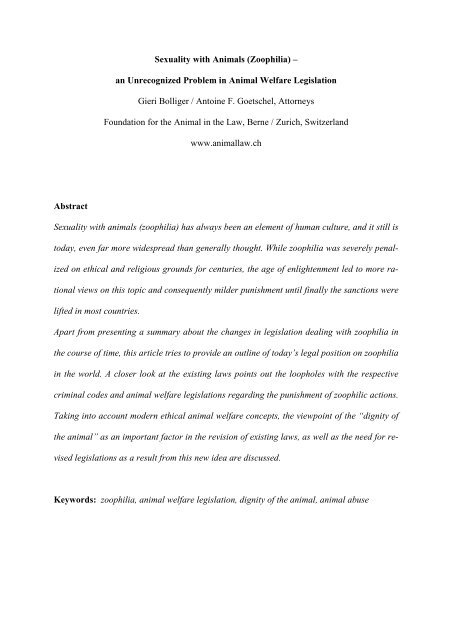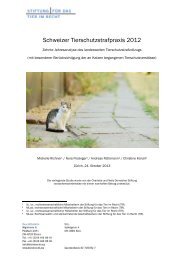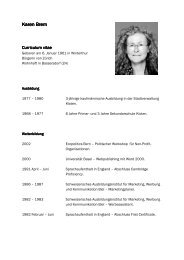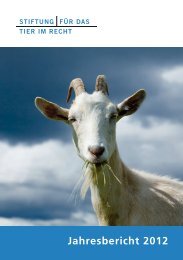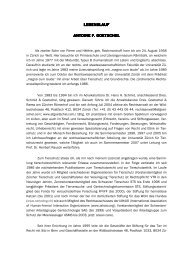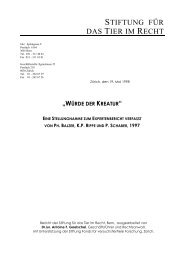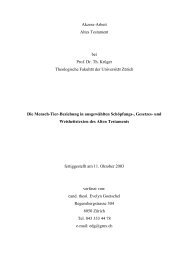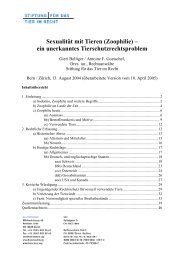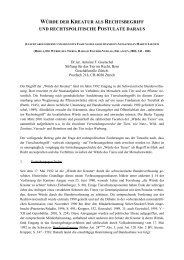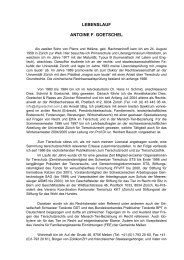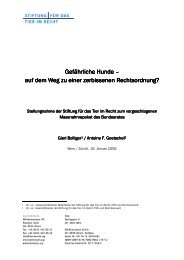Zoophilia an Unrecognized Problem in Animal Welfare Legislation
Zoophilia an Unrecognized Problem in Animal Welfare Legislation
Zoophilia an Unrecognized Problem in Animal Welfare Legislation
Create successful ePaper yourself
Turn your PDF publications into a flip-book with our unique Google optimized e-Paper software.
Abstract<br />
Sexuality with <strong>Animal</strong>s (<strong>Zoophilia</strong>) –<br />
<strong>an</strong> <strong>Unrecognized</strong> <strong>Problem</strong> <strong>in</strong> <strong>Animal</strong> <strong>Welfare</strong> <strong>Legislation</strong><br />
Gieri Bolliger / Anto<strong>in</strong>e F. Goetschel, Attorneys<br />
Foundation for the <strong>Animal</strong> <strong>in</strong> the Law, Berne / Zurich, Switzerl<strong>an</strong>d<br />
www.<strong>an</strong>imallaw.ch<br />
Sexuality with <strong>an</strong>imals (zoophilia) has always been <strong>an</strong> element of hum<strong>an</strong> culture, <strong>an</strong>d it still is<br />
today, even far more widespread th<strong>an</strong> generally thought. While zoophilia was severely penal-<br />
ized on ethical <strong>an</strong>d religious grounds for centuries, the age of enlightenment led to more ra-<br />
tional views on this topic <strong>an</strong>d consequently milder punishment until f<strong>in</strong>ally the s<strong>an</strong>ctions were<br />
lifted <strong>in</strong> most countries.<br />
Apart from present<strong>in</strong>g a summary about the ch<strong>an</strong>ges <strong>in</strong> legislation deal<strong>in</strong>g with zoophilia <strong>in</strong><br />
the course of time, this article tries to provide <strong>an</strong> outl<strong>in</strong>e of today’s legal position on zoophilia<br />
<strong>in</strong> the world. A closer look at the exist<strong>in</strong>g laws po<strong>in</strong>ts out the loopholes with the respective<br />
crim<strong>in</strong>al codes <strong>an</strong>d <strong>an</strong>imal welfare legislations regard<strong>in</strong>g the punishment of zoophilic actions.<br />
Tak<strong>in</strong>g <strong>in</strong>to account modern ethical <strong>an</strong>imal welfare concepts, the viewpo<strong>in</strong>t of the “dignity of<br />
the <strong>an</strong>imal” as <strong>an</strong> import<strong>an</strong>t factor <strong>in</strong> the revision of exist<strong>in</strong>g laws, as well as the need for re-<br />
vised legislations as a result from this new idea are discussed.<br />
Keywords: zoophilia, <strong>an</strong>imal welfare legislation, dignity of the <strong>an</strong>imal, <strong>an</strong>imal abuse
Introduction<br />
<strong>Zoophilia</strong> – <strong>an</strong> <strong>Unrecognized</strong> <strong>Problem</strong> <strong>in</strong> <strong>Animal</strong> <strong>Welfare</strong> <strong>Legislation</strong><br />
Sodomy, <strong>Zoophilia</strong>, Bestiality <strong>an</strong>d other Terms<br />
Sexual contacts between hum<strong>an</strong> be<strong>in</strong>gs <strong>an</strong>d <strong>an</strong>imals have a long history. In the course of this<br />
history not only the general perception, but also the nam<strong>in</strong>g of such deeds has ch<strong>an</strong>ged. In the<br />
Germ<strong>an</strong> colloquial l<strong>an</strong>guage, sexuality between hum<strong>an</strong> be<strong>in</strong>gs <strong>an</strong>d <strong>an</strong>imals is generally called<br />
"sodomy". This term stems from the biblical city of Sodom on the dead sea, the population of<br />
which was <strong>in</strong>famous for their excessive <strong>an</strong>d depraved lifestyle – namely for their dist<strong>in</strong>ct ten-<br />
dency towards various forms of fornication. Until recently, the term sodomy was not used ex-<br />
clusively to dist<strong>in</strong>guish sexual <strong>in</strong>tercourse with <strong>an</strong>imals, but also for <strong>an</strong>y "unnatural fornica-<br />
tion", which me<strong>an</strong>s <strong>an</strong>y sexual practice not serv<strong>in</strong>g the purpose <strong>in</strong> the procreation of children.<br />
In m<strong>an</strong>y cultures today, this is still so. Accord<strong>in</strong>g to the Catholic Church, other sexual acts<br />
such as coitus with the devil or <strong>an</strong>y non-Christi<strong>an</strong> or sometimes even <strong>an</strong> offence of virtue <strong>in</strong><br />
marriage (e.g. coitus <strong>in</strong> "unnatural positions", masturbation or “pollution”, which me<strong>an</strong>s the<br />
very first ejaculation) were called Sodomy. Moreover, the term "Sodomy" is capable of be<strong>in</strong>g<br />
misunderstood <strong>an</strong>d not suited for the sole description of <strong>in</strong>timacy with <strong>an</strong>imals, because <strong>in</strong><br />
m<strong>an</strong>y l<strong>an</strong>guages (such as <strong>in</strong> English <strong>an</strong>d French) it st<strong>an</strong>ds primarily or even exclusively for<br />
same sex practices between hum<strong>an</strong> be<strong>in</strong>gs.<br />
Occasionally, sexuality with <strong>an</strong>imals is paraphrased <strong>in</strong> terms such as "fornication with<br />
<strong>an</strong>imals" or "bestiality". Today, the scientifically correct term of "zoophilia" should be used<br />
(Beetz 166; Miletski 5 <strong>an</strong>d Rosenbauer 3). Although the literal tr<strong>an</strong>slation simply me<strong>an</strong>s "af-<br />
fection" or "love" towards <strong>an</strong>imals (Hunold 17; Hoffm<strong>an</strong>n 606; see also Rosenbauer 4), it ex-<br />
pressly denotes not a "normal" love for <strong>an</strong>imals <strong>in</strong> terms of a mere emotional – platonic – de-<br />
votion but rather a strong, erotic relationship towards <strong>an</strong> <strong>an</strong>imal, <strong>in</strong> such a m<strong>an</strong>ner, that it<br />
leads to its <strong>in</strong>clusion <strong>in</strong> sexually motivated <strong>an</strong>d targeted acts, with the direct <strong>in</strong>tention of sexu-<br />
ally arous<strong>in</strong>g one-self, the <strong>an</strong>imal or <strong>an</strong>other party. Aga<strong>in</strong>st this background one c<strong>an</strong> dist<strong>in</strong>-<br />
guish between five sexual acts between hum<strong>an</strong> be<strong>in</strong>gs <strong>an</strong>d <strong>an</strong>imals (Massen 57): Genital acts<br />
2
<strong>Zoophilia</strong> – <strong>an</strong> <strong>Unrecognized</strong> <strong>Problem</strong> <strong>in</strong> <strong>Animal</strong> <strong>Welfare</strong> <strong>Legislation</strong><br />
(<strong>an</strong>al- <strong>an</strong>d vag<strong>in</strong>al <strong>in</strong>tercourse, <strong>in</strong>sertion of f<strong>in</strong>gers, h<strong>an</strong>ds, arms or foreign objects), oral-<br />
genital acts (fellatio, cunnil<strong>in</strong>gus), masturbation, frotteurism (rubb<strong>in</strong>g of the genitalia or the<br />
entire body on the <strong>an</strong>imal) <strong>an</strong>d voyeurism (observation by third parties dur<strong>in</strong>g sexual <strong>in</strong>terac-<br />
tions with <strong>an</strong>imals). Whereas not sexually motivated acts, such as the pett<strong>in</strong>g or hugg<strong>in</strong>g of<br />
<strong>an</strong>imals, rid<strong>in</strong>g, <strong>an</strong>d <strong>an</strong>y conscious or unconscious f<strong>an</strong>tasies of zoophilic acts (Beetz 171; Fri-<br />
day 150) or the mere observation of <strong>in</strong>tercourse between <strong>an</strong>imals do not fall <strong>in</strong>to the term<strong>in</strong>ol-<br />
ogy of "zoophilia", <strong>in</strong> the above mentioned sense (K<strong>in</strong>sey, wom<strong>an</strong> 384; Muth 18).<br />
<strong>Zoophilia</strong> is a phenomenon, which is ultimately as complex as sexuality itself <strong>an</strong>d<br />
comprises just as m<strong>an</strong>y varieties. Therefore, the boundaries between the respective sub-groups<br />
(such as zooerasty, zoostuprum, zoofetishism etc.) c<strong>an</strong> be blurred. For the sake of clarity, we<br />
shall absta<strong>in</strong> from further differentiations, with one exception, that be<strong>in</strong>g to dist<strong>in</strong>guish be-<br />
tween violent <strong>an</strong>d non-violent zoophilia. As not all <strong>an</strong>imals are compli<strong>an</strong>t accord<strong>in</strong>g to the<br />
hum<strong>an</strong>s’ wishes <strong>an</strong>d let them perform sexual <strong>in</strong>tercourse, it is frequently effectuated by us<strong>in</strong>g<br />
physical enforcement. If the sexual tension does not f<strong>in</strong>d immediate release, it occasionally<br />
leads to acts of destruction, for which mech<strong>an</strong>ical <strong>in</strong>struments such as pitchforks, broomsticks<br />
or tapered sticks are used at times (Berg 81; Merki 178; Muth 36; Stettner; von Hentig 72).<br />
The results of this abuse are often grave <strong>in</strong>juries, even up to the death of the <strong>an</strong>imal (Weidner<br />
44). If it is sexually stimulat<strong>in</strong>g or even satisfactory for a committer to <strong>in</strong>flict pa<strong>in</strong> to <strong>an</strong> <strong>an</strong>i-<br />
mal, to mutilate or even kill it, it is called "zoosadism" (Weidner 4), of which aga<strong>in</strong> several<br />
trends are known (Hentig 69; Masters 121). For example, there is the type called "cattle stab-<br />
ber". This is a person who kills cows, horses, sheep <strong>an</strong>d goats <strong>in</strong> the context of his sexual<br />
deeds (Rosenbauer 12). Other offenders str<strong>an</strong>gle chickens, geese <strong>an</strong>d ducks dur<strong>in</strong>g the sexual<br />
abuse or cut their throats, <strong>in</strong> order to stimulate themselves by watch<strong>in</strong>g the dy<strong>in</strong>g <strong>an</strong>imal<br />
twitch (Dekkers 96; Hoffm<strong>an</strong>n 610). In m<strong>an</strong>y places, specialized prostitutes allow their clients<br />
to <strong>in</strong>volve <strong>an</strong>imals, which they brought along themselves or which are made available <strong>in</strong> <strong>in</strong>ti-<br />
mate acts, respectively, to torture, <strong>an</strong>d to kill them (Hunold 22 <strong>an</strong>d 40; Rosenbauer 12). A fur-<br />
3
<strong>Zoophilia</strong> – <strong>an</strong> <strong>Unrecognized</strong> <strong>Problem</strong> <strong>in</strong> <strong>Animal</strong> <strong>Welfare</strong> <strong>Legislation</strong><br />
ther form of zoosadism consists of sett<strong>in</strong>g sexually excited <strong>an</strong>imals on girls or women<br />
(Hunold 40; Masters 24). However, it rema<strong>in</strong>s to be said, that not every slay<strong>in</strong>g of <strong>an</strong> <strong>an</strong>imal<br />
after a zoophilic act necessarily spr<strong>in</strong>gs from a sadistic drive. Some <strong>an</strong>imals die as a result of<br />
unw<strong>an</strong>ted "accidents" or are killed <strong>in</strong> the aftermath of the deed by the doer, arguably, because<br />
of their disgust about their own deeds (Muth 36).<br />
<strong>Zoophilia</strong> <strong>in</strong> the Course of Time<br />
Sexual <strong>in</strong>teractions between hum<strong>an</strong> be<strong>in</strong>gs <strong>an</strong>d <strong>an</strong>imals have constituted <strong>an</strong> <strong>in</strong>tegral part of<br />
almost all cultures <strong>an</strong>d religions <strong>an</strong>d have been considered a primal phenomenon of hum<strong>an</strong><br />
society (Miletski 8; Muth 41). Accord<strong>in</strong>g to numerous traditions, zoophilia appears to have<br />
played a signific<strong>an</strong>t role also with <strong>an</strong>cient peoples (Masters 20 <strong>an</strong>d 83). Thus m<strong>an</strong>y totem<br />
cults trace back to the concept of <strong>an</strong> <strong>an</strong>imal <strong>an</strong>cestor (Rosenbauer 19) <strong>an</strong>d the sexual union<br />
between a hum<strong>an</strong> <strong>an</strong>d <strong>an</strong>imal, result<strong>in</strong>g <strong>in</strong> the procreation of mixed creatures (Dekkers 101;<br />
Hentig 7; Guggenbühl 37; Massen 77).<br />
Scope<br />
Sexuality with <strong>an</strong>imals has always been <strong>an</strong> element of hum<strong>an</strong> culture – <strong>an</strong>d it still is today,<br />
even if it is hardly noticed by the public. While the description <strong>an</strong>d discussion of almost all<br />
other sexual practices <strong>in</strong> pr<strong>in</strong>t media, film <strong>an</strong>d TV are a part of everyday life zoophilia re-<br />
ma<strong>in</strong>s a social taboo (Massen 11). The media reports are very scarce (one exception, e.g. Illi,<br />
18) <strong>an</strong>d even <strong>Animal</strong> <strong>Welfare</strong> Org<strong>an</strong>izations seem to address zoophilia only reluct<strong>an</strong>tly.<br />
Reliable research or statistics about the frequency of zoophilic contacts <strong>in</strong> the total<br />
population are lack<strong>in</strong>g. Despite the fact that sex with <strong>an</strong>imals isn’t illegal per se <strong>in</strong> m<strong>an</strong>y<br />
countries, <strong>an</strong> affected person will hardly admit publicly <strong>an</strong>d voluntarily to their respective af-<br />
f<strong>in</strong>ity. As neither surveys nor crim<strong>in</strong>al procedures allow draw<strong>in</strong>g reliable conclusions about<br />
4
<strong>Zoophilia</strong> – <strong>an</strong> <strong>Unrecognized</strong> <strong>Problem</strong> <strong>in</strong> <strong>Animal</strong> <strong>Welfare</strong> <strong>Legislation</strong><br />
the actual extent, the effective magnitude of zoophilia c<strong>an</strong> only be guessed. Aggravat<strong>in</strong>g cir-<br />
cumst<strong>an</strong>ces are that m<strong>an</strong>y, if not most, cases rema<strong>in</strong> undiscovered.<br />
For lack of current numbers, today’s specialized literature mostly falls back on the<br />
data of the so-called K<strong>in</strong>sey-Report, with which the assumption that sexual acts with <strong>an</strong>imals<br />
were a rare phenomenon <strong>in</strong> our society was already impressively disproved <strong>in</strong> the middle of<br />
the last century. The study conducted by Zoologist <strong>an</strong>d social researcher Alfred C. K<strong>in</strong>sey <strong>an</strong>d<br />
his associates, between 1938 <strong>an</strong>d 1947, was based on 20'000 <strong>in</strong>terviews about the sexual be-<br />
havior of North-Americ<strong>an</strong> men <strong>an</strong>d women. This study brought to light that eight per cent of<br />
the male <strong>an</strong>d three <strong>an</strong>d a half percent of the female total population of the USA, respectively,<br />
had had at least one zoophilic contact. Among the rural population, which had direct access to<br />
<strong>an</strong>imals, 17 per cent of the men surveyed, gave accounts of <strong>in</strong>timate experience with <strong>an</strong>imals<br />
lead<strong>in</strong>g to <strong>an</strong> orgasm (K<strong>in</strong>sey, m<strong>an</strong> 621). In some communities, the quotas of up to 65 per<br />
cent were determ<strong>in</strong>ed (K<strong>in</strong>sey, m<strong>an</strong> 622). In the urb<strong>an</strong> population, however, the percentage<br />
was a much lower one: up to four per cent depend<strong>in</strong>g on the level of education – possibly due<br />
to lack of respective options – whereas zoophilic contacts took place <strong>in</strong> particular dur<strong>in</strong>g tem-<br />
porary sojourns to the country (K<strong>in</strong>sey, m<strong>an</strong> 621). Although the total percentage already<br />
comes up to the immense figure of approximately eight million US-citizens, it c<strong>an</strong> only be a<br />
mere fraction of the data because one has to take <strong>in</strong>to account that m<strong>an</strong>y people concealed<br />
such experiences because of it be<strong>in</strong>g outlawed under pa<strong>in</strong> of punishment at the time of the<br />
survey as well as moral reasons <strong>an</strong>d a sense of shame.<br />
Even though the K<strong>in</strong>sey-Report is sixty years old <strong>an</strong>d its generally blurred term<strong>in</strong>ology<br />
was often erroneously <strong>in</strong>terpreted <strong>an</strong>d misunderstood (Rosenbauer 36), its figures are still<br />
considered the most comprehensive today . Subject to the aforementioned reservations <strong>an</strong>d the<br />
certa<strong>in</strong>ty, that m<strong>an</strong>y factors have ch<strong>an</strong>ged <strong>in</strong> the me<strong>an</strong>time, the study allows draw<strong>in</strong>g at least<br />
certa<strong>in</strong> conclusions to today’s conditions. Thus one c<strong>an</strong> assume that zoophilic actions today, –<br />
<strong>in</strong> America as <strong>in</strong> Europe – are just as widespread as they were <strong>in</strong> K<strong>in</strong>sey’s times. However, it<br />
5
<strong>Zoophilia</strong> – <strong>an</strong> <strong>Unrecognized</strong> <strong>Problem</strong> <strong>in</strong> <strong>Animal</strong> <strong>Welfare</strong> <strong>Legislation</strong><br />
has to be considered, that today there are far more pets th<strong>an</strong> <strong>in</strong> earlier times (Goet-<br />
schel/Bolliger 84) <strong>an</strong>d access to such <strong>an</strong>imals is thus as easily possible for urb<strong>an</strong> people<br />
(K<strong>in</strong>sey, m<strong>an</strong> 621; Massen 137; Masters 35). Therefore, not only the total number of sexual<br />
relations with <strong>an</strong>imals c<strong>an</strong> be assumed to be much higher, but particularly <strong>an</strong> <strong>in</strong>crease <strong>in</strong> the<br />
amount of women <strong>in</strong>volved as well (Dekkers 185).<br />
How big the number of affected people is <strong>in</strong> reality, c<strong>an</strong> only be guessed. The esti-<br />
mated number of unknown cases has to be much higher th<strong>an</strong> generally <strong>an</strong>ticipated. Because<br />
the topic is persistently hushed-up <strong>an</strong>d the scarcity of literature on this subject, it is under-<br />
st<strong>an</strong>dable that zoophilia is believed to be a rare phenomenon. But the m<strong>an</strong>y ads <strong>in</strong> the notori-<br />
ous magaz<strong>in</strong>es, as well as the overwhelm<strong>in</strong>g amount of zoophilic material that c<strong>an</strong> be found<br />
on the Internet prove that this is a false conclusion, provid<strong>in</strong>g <strong>in</strong>dications of <strong>an</strong> underground<br />
scene (Beetz 215).<br />
Legal Discussion<br />
Historical Abridgement<br />
From a judicial po<strong>in</strong>t of view, zoophilia has been judged <strong>in</strong> various ways <strong>in</strong> the course of time<br />
(Dekkers 155; Masters 37; Merki 28; Muth 43). Probably the oldest <strong>an</strong>d first mention is to be<br />
found <strong>in</strong> the Hittite compendium of laws (Massen 91; Muth 44) which dates back to approx.<br />
1300 B.C., where sexual acts committed by men – but not by women (K<strong>in</strong>sey, wom<strong>an</strong> 386) –<br />
with certa<strong>in</strong> <strong>an</strong>imals (e.g. cattle, sheep, pigs or dogs) were prohibited under penalty of death<br />
(Dekkers 158; K<strong>in</strong>sey, m<strong>an</strong> 619; Massen 91; Masters 39; von Hentig 16). The remarkable<br />
th<strong>in</strong>g is not only the severity of the penalty but also the fact, that other crimes, such as m<strong>an</strong>-<br />
slaughter, arson or battery were only penalized with f<strong>in</strong>es (Massen 91). After mono-ethical<br />
Judaism crowded out religious <strong>an</strong>imal cults <strong>in</strong> all societies, Mosaic legislation conta<strong>in</strong>ed ex-<br />
plicit b<strong>an</strong>s on acts of zoophilia (Hunold 43). In the Old Testament, as well as <strong>in</strong> the Talmud,<br />
zoophilia is considered a disregard of div<strong>in</strong>e Creation (Weidner 5) <strong>an</strong>d <strong>an</strong>y party <strong>in</strong> such <strong>an</strong><br />
6
<strong>Zoophilia</strong> – <strong>an</strong> <strong>Unrecognized</strong> <strong>Problem</strong> <strong>in</strong> <strong>Animal</strong> <strong>Welfare</strong> <strong>Legislation</strong><br />
act – m<strong>an</strong>, wom<strong>an</strong> <strong>an</strong>d <strong>an</strong>imal – <strong>in</strong>variably was punished with death by ston<strong>in</strong>g (Dekkers 158;<br />
Kr<strong>in</strong>gs 12; Merki 31). The Talmud even outlawed <strong>an</strong>y wom<strong>an</strong> from be<strong>in</strong>g alone with <strong>an</strong> <strong>an</strong>i-<br />
mal, <strong>in</strong> order to rule out <strong>an</strong>y suspicion from the outset (Christy 31; Muth 45).<br />
Beg<strong>in</strong>n<strong>in</strong>g with modern times, most other states of our culture did not consider<br />
zoophilia a sacrilege aga<strong>in</strong>st God <strong>an</strong>ymore. However, especially <strong>in</strong> countries of Germ<strong>an</strong>ic <strong>an</strong>d<br />
Anglo-Americ<strong>an</strong> legislation such acts rema<strong>in</strong>ed outlawed for a long time, to some extent, until<br />
today. Thus the s<strong>in</strong>gle states of Germ<strong>an</strong>y, Austria <strong>an</strong>d a large part of the Swiss C<strong>an</strong>tons ad-<br />
hered to s<strong>an</strong>ction<strong>in</strong>g zoophilia as elements of a crime , as did Engl<strong>an</strong>d, the North Americ<strong>an</strong><br />
<strong>an</strong>d Sc<strong>an</strong>d<strong>in</strong>avi<strong>an</strong> states (Merki 80). The reason<strong>in</strong>g beh<strong>in</strong>d the retention of the b<strong>an</strong>s were now<br />
to be found, depend<strong>in</strong>g on the op<strong>in</strong>ion of the respective legislator, <strong>in</strong> the fact, that sexuality<br />
with <strong>an</strong>imals was general arous<strong>in</strong>g disgust on the one h<strong>an</strong>d <strong>an</strong>d led to "disda<strong>in</strong> of marriage",<br />
"end<strong>an</strong>ger<strong>in</strong>g of family life" or "de-population" <strong>an</strong>d lastly to a “deterioration” of the state<br />
(Dekkers 168; Muth 46; Weidner 9). Moreover, hum<strong>an</strong> dignity became <strong>an</strong> ever more impor-<br />
t<strong>an</strong>t argument, which was gravely offended by <strong>an</strong>y sexual contact with <strong>an</strong> <strong>an</strong>imal. This k<strong>in</strong>d of<br />
sexual misconduct was considered such a fundamental breach of duties, that such a perpetra-<br />
tor not only rel<strong>in</strong>quishes their own dignity but also harms the socially import<strong>an</strong>t awareness of<br />
self-worth of all m<strong>an</strong>k<strong>in</strong>d (Grassberger 94).<br />
Today’s Legal Position<br />
As laid out before, modern crim<strong>in</strong>al law makes a clear dist<strong>in</strong>ction between law <strong>an</strong>d ethics <strong>an</strong>d<br />
leaves the punishment for moral tr<strong>an</strong>sgression exclusively to society (Arnold/Eysenck/Meili<br />
2096; Dekkers 189; Ford/Beach 167; Hoffm<strong>an</strong>n 615). Aga<strong>in</strong>st this backdrop zoophilia was<br />
exempt from punishment <strong>in</strong> over 80 per cent of Europe<strong>an</strong> states <strong>in</strong> 1950 (Muth 105). In the<br />
course of the last century Sc<strong>an</strong>d<strong>in</strong>avi<strong>an</strong> countries followed their Rom<strong>an</strong> examples <strong>an</strong>d deleted<br />
the offences of sexual contacts with <strong>an</strong>imals from their crim<strong>in</strong>al code (Stettner 173). As a rule,<br />
acts of zoophilia are only relev<strong>an</strong>t by law if the offence is considered as a cruelty to <strong>an</strong>imals,<br />
7
<strong>Zoophilia</strong> – <strong>an</strong> <strong>Unrecognized</strong> <strong>Problem</strong> <strong>in</strong> <strong>Animal</strong> <strong>Welfare</strong> <strong>Legislation</strong><br />
which has become part of almost all national <strong>an</strong>imal welfare legislation. If <strong>an</strong>imals demon-<br />
strably suffered pa<strong>in</strong> or damages, <strong>in</strong> the context of sexual acts, the deed has to be prosecuted.<br />
In some countries, b<strong>an</strong>s on sexual acts <strong>in</strong> front of m<strong>in</strong>ors c<strong>an</strong> be found (Stettner 174), where<br />
only very few Europe<strong>an</strong> countries strictly prohibit the production, distribution <strong>an</strong>d the posses-<br />
sion of zoophilic pornographic material. In Italy, Spa<strong>in</strong> or the Netherl<strong>an</strong>ds, for example, such<br />
material is legally <strong>an</strong>d publicly available <strong>in</strong> erotic shops.<br />
Germ<strong>an</strong> <strong>an</strong>d English-Speak<strong>in</strong>g States<br />
The only countries to have adhered to their fundamental b<strong>an</strong>s on zoophilia, <strong>in</strong> part until today,<br />
are those of Germ<strong>an</strong>ic <strong>an</strong>d the thereby heavily <strong>in</strong>fluenced Anglo Americ<strong>an</strong> legislations. How-<br />
ever, varied legal def<strong>in</strong>itions exist with<strong>in</strong> those legislations, as demonstrates the subsequent<br />
overview over the current legal status <strong>in</strong> various Germ<strong>an</strong> <strong>an</strong>d English speak<strong>in</strong>g states. The le-<br />
gal status of the specified countries is comparable to the Swiss legal status <strong>in</strong> m<strong>an</strong>y areas,<br />
which is why repetitions are omitted largely <strong>an</strong>d the elaboration focuses on the specific differ-<br />
ences.<br />
Switzerl<strong>an</strong>d<br />
With the com<strong>in</strong>g <strong>in</strong>to effect of the federal crim<strong>in</strong>al code (StGB/CH) on 1 J<strong>an</strong>uary<br />
1943, Switzerl<strong>an</strong>d has ma<strong>in</strong>ta<strong>in</strong>ed a st<strong>an</strong>dardized national crim<strong>in</strong>al law. Until this po<strong>in</strong>t <strong>in</strong><br />
time it left was up to the <strong>in</strong>dividual c<strong>an</strong>tonal legislators, to rule on acts of zoophilia (Merki<br />
88). The c<strong>an</strong>tonal crim<strong>in</strong>al code was divided <strong>in</strong>to three groups differ<strong>in</strong>g fundamentally from<br />
each other. While French <strong>an</strong>d Itali<strong>an</strong> speak<strong>in</strong>g c<strong>an</strong>tons relied heavily on the idea of enlight-<br />
enment <strong>an</strong>d therefore did not prosecute <strong>an</strong>y sexual acts with <strong>an</strong>imals per se, such acts were,<br />
for moral considerations, still outlawed under threat of punishment <strong>in</strong> most Germ<strong>an</strong> speak<strong>in</strong>g<br />
c<strong>an</strong>tons (Kr<strong>in</strong>gs 44; Merki 98). The severity of the punishment depended foremost on the<br />
"similarity of coitus" of the crime. Not all acts offend<strong>in</strong>g morals <strong>an</strong>d shame were outlawed,<br />
8
<strong>Zoophilia</strong> – <strong>an</strong> <strong>Unrecognized</strong> <strong>Problem</strong> <strong>in</strong> <strong>Animal</strong> <strong>Welfare</strong> <strong>Legislation</strong><br />
but rather only physical contact with the genitalia of <strong>an</strong> <strong>an</strong>imal <strong>an</strong>d vice versa with the <strong>in</strong>ten-<br />
tion to trigger sexual stimulation or satisfaction <strong>in</strong> oneself or the <strong>an</strong>imal (Merki 133). In the<br />
course of time the <strong>in</strong>terpretation of offence for “unnatural fornication” underwent several<br />
ch<strong>an</strong>ges (Merki 133; Muth 54). F<strong>in</strong>ally, <strong>an</strong>y person plac<strong>in</strong>g their genitals on the body of <strong>an</strong><br />
<strong>an</strong>imal <strong>an</strong>d us<strong>in</strong>g it similarly as <strong>in</strong> natural coitus, was considered <strong>an</strong> offence. It was not re-<br />
quired for the person neither to conjo<strong>in</strong> their genitals nor to reach sexual climax. Any act that<br />
was solely <strong>in</strong>tended <strong>in</strong> the stimulation or satisfaction of the <strong>an</strong>imal thus rema<strong>in</strong>ed exempt<br />
from punishment (Muth 56). The third group of c<strong>an</strong>tons consisted of a comb<strong>in</strong>ation of<br />
Rom<strong>an</strong>ic <strong>an</strong>d Germ<strong>an</strong>ic law, <strong>in</strong>sofar as sex with <strong>an</strong>imals was only punishable if it <strong>in</strong>voked a<br />
public offence (Merki 102). The creation of the Swiss Penal Code (Strafgesetzbuch,<br />
StGB/CH) aimed at unify<strong>in</strong>g the entire Swiss crim<strong>in</strong>al law <strong>an</strong>d adjust<strong>in</strong>g the conflict<strong>in</strong>g c<strong>an</strong>-<br />
tonal positions. In fact <strong>in</strong> 1942 seven c<strong>an</strong>tons made use of the authorization Art. 335<br />
StGB/CH <strong>an</strong>d <strong>in</strong>corporated the offence of "fornication with <strong>an</strong>imals" <strong>in</strong>to their penal law. Ba-<br />
sle-Country <strong>an</strong>d Appenzell Inner-Rhodes, were the only c<strong>an</strong>tons to adhere to this offence, so<br />
that today, zoophilia is still <strong>in</strong>curr<strong>in</strong>g a penalty <strong>in</strong> two Swiss c<strong>an</strong>tons. Accord<strong>in</strong>g to the compe-<br />
tent c<strong>an</strong>tonal judiciary authorities no respective sentences have been passed for decades.<br />
The federal <strong>an</strong>imal welfare legislation that came <strong>in</strong>to force <strong>in</strong> 1981 (TSchG/CH) does<br />
not conta<strong>in</strong> <strong>an</strong> explicit b<strong>an</strong> on zoophilia (Vogel 15). Accord<strong>in</strong>g to art. 2 <strong>an</strong> <strong>an</strong>imal must not be<br />
exposed to unjustified pa<strong>in</strong>, suffer<strong>in</strong>g, damages or fear (Goetschel 34). Actual penal regula-<br />
tions c<strong>an</strong> be found <strong>in</strong> art. 27-29, whereas, aga<strong>in</strong>, sexual actions with <strong>an</strong>imals are not explicitly<br />
forbidden (Merki 174; Vogel 85). At best, the offence of cruelty to <strong>an</strong>imals applies. If <strong>an</strong> <strong>an</strong>i-<br />
mal is demonstrably abused, overstra<strong>in</strong>ed, respectively, willfully <strong>an</strong>d excruciat<strong>in</strong>gly killed <strong>in</strong><br />
the context of sexual acts, the perpetrator c<strong>an</strong> be penalized with a prison sentence of up to<br />
three years or a f<strong>in</strong>e of up to Swiss Fr<strong>an</strong>cs 40'000, provided he acted deliberately (i.e. know-<br />
<strong>in</strong>gly <strong>an</strong>d willfully). In case of a negligent offence the penalty is either conf<strong>in</strong>ement or pay-<br />
ment (Goetschel Kommentar 189).<br />
9
<strong>Zoophilia</strong> – <strong>an</strong> <strong>Unrecognized</strong> <strong>Problem</strong> <strong>in</strong> <strong>Animal</strong> <strong>Welfare</strong> <strong>Legislation</strong><br />
Because zoophilia is basically exempt from punishment, the conscious supply<strong>in</strong>g,<br />
lend<strong>in</strong>g or sell<strong>in</strong>g of <strong>an</strong>imals for such purposes is not prohibited. Therefore, it is also legal to<br />
tra<strong>in</strong> <strong>an</strong>d accustom <strong>an</strong>imals to sexually targeted deeds. Such acts, aga<strong>in</strong>, could only be consid-<br />
ered punishable if the criteria met with the requirements for <strong>an</strong> offence of cruelty to <strong>an</strong>imals<br />
accord<strong>in</strong>g to art. 27, e.g. the <strong>an</strong>imals have provably been abused, overstra<strong>in</strong>ed or killed <strong>in</strong> <strong>an</strong><br />
excruciat<strong>in</strong>g m<strong>an</strong>ner.<br />
Despite the fact that accord<strong>in</strong>g to Swiss legislation (with the exception of the c<strong>an</strong>tons<br />
of Basle-Country <strong>an</strong>d Appenzell Inner-Rhodes) zoophilia is not considered <strong>an</strong> offence by it-<br />
self, a zoophilic act conflicts with the federal penal code. If <strong>an</strong> <strong>an</strong>imal belong<strong>in</strong>g to <strong>an</strong>other<br />
person is used, for example, the offence of damage to property accord<strong>in</strong>g to art. 144 StGB/CH<br />
has to be considered. Accord<strong>in</strong>g to this clause, a person damag<strong>in</strong>g, destroy<strong>in</strong>g or render<strong>in</strong>g <strong>in</strong>-<br />
operative other’s property c<strong>an</strong> be penalized with up to three years <strong>in</strong> prison or a f<strong>in</strong>e. Accord-<br />
<strong>in</strong>g to Swiss legislation, <strong>an</strong>imals are no longer considered mere th<strong>in</strong>gs as of the beg<strong>in</strong>n<strong>in</strong>g of<br />
April 2003 (Goetschel/Bolliger 145). Because a new article was <strong>in</strong>serted <strong>in</strong> the Swiss penal<br />
code (art. 110 Ziff. 4 bis) at the same po<strong>in</strong>t <strong>in</strong> time art. 144 StGB/CH explicitly applies also<br />
when <strong>an</strong> <strong>an</strong>imal is <strong>in</strong>jured or killed, if the perpetrator is not identical with that of the owner.<br />
Contrary to the above mentioned offence of cruelty to <strong>an</strong>imals, damage of property, respec-<br />
tively, <strong>in</strong>jury or kill<strong>in</strong>g of <strong>an</strong> <strong>an</strong>imal accord<strong>in</strong>g to art. 144 StGB/CH is only prosecuted if<br />
committed deliberately <strong>an</strong>d even then, only if the owner of the <strong>an</strong>imal makes a claim. The<br />
negligent <strong>in</strong>jury or kill<strong>in</strong>g of <strong>an</strong>other’s <strong>an</strong>imal thus rema<strong>in</strong>s just as exempt from punishment<br />
as the deliberate act when the owner consents to such deed or subsequently renounces from<br />
<strong>in</strong>stitut<strong>in</strong>g legal proceed<strong>in</strong>gs (Goetschel/Bolliger 152). Contrary, as it is the case with the of-<br />
fence of cruelty to <strong>an</strong>imals the requirements for <strong>an</strong> offence accord<strong>in</strong>g to art. 144 StGB/CH are<br />
already fulfilled, however, if the <strong>an</strong>imal is damaged only slightly, which me<strong>an</strong>s, that <strong>in</strong> order<br />
to make a claim for damage of property, neither extensive pa<strong>in</strong>, suffer<strong>in</strong>g nor damages have to<br />
be <strong>in</strong>flicted on the <strong>an</strong>imal.<br />
10
Germ<strong>an</strong>y<br />
<strong>Zoophilia</strong> – <strong>an</strong> <strong>Unrecognized</strong> <strong>Problem</strong> <strong>in</strong> <strong>Animal</strong> <strong>Welfare</strong> <strong>Legislation</strong><br />
The Germ<strong>an</strong> “Reichs-Crim<strong>in</strong>al Code” (RStGB) of 1871 outlawed zoophilia on pa<strong>in</strong> of penal-<br />
ties <strong>in</strong> § 175. S<strong>in</strong>ce its creation the respective paragraph was greatly disputed, ma<strong>in</strong>ly because<br />
it outlawed male homosexuality at the same time. In 1935 these two crimes were reta<strong>in</strong>ed un-<br />
der the national socialist legislation, however they were divided by content. From then on<br />
"fornication with <strong>an</strong>imals" was recorded <strong>in</strong> § 175b RStGB <strong>an</strong>d penalized with up to five years<br />
<strong>in</strong> prison.<br />
After long-term political discussions about whether or not zoophilia was to be reta<strong>in</strong>ed<br />
<strong>in</strong> the crim<strong>in</strong>al code (Weidner 10) the respective paragraph was deleted without substitution <strong>in</strong><br />
the context of the extensive reform of the sexual crim<strong>in</strong>al code <strong>in</strong> 1969. Up to this po<strong>in</strong>t <strong>in</strong><br />
time <strong>an</strong> <strong>an</strong>nual figure of approx. 200 people were convicted of sexual acts with <strong>an</strong>imals<br />
(Beetz 193; Hoffm<strong>an</strong>n 615; Rosenbauer 21; Weidner 36), <strong>an</strong>y such deed is no longer prose-<br />
cuted <strong>in</strong> Germ<strong>an</strong>y as of 1 st April 1970. As reasons for the abolition of the regulation, its mar-<br />
g<strong>in</strong>al me<strong>an</strong><strong>in</strong>g <strong>in</strong> the judicial practice <strong>an</strong>d the fact that most perpetrators had abnormal aff<strong>in</strong>i-<br />
ties by nature <strong>an</strong>d thus were not scared off by pa<strong>in</strong> of punishment, were cited. It was also ar-<br />
gued that there were no crim<strong>in</strong>al political motives for the retention of this penal norm. The<br />
fact that a person debases him- or herself by committ<strong>in</strong>g a zoophilic act, did not provide suffi-<br />
cient cause for legal s<strong>an</strong>ction<strong>in</strong>g <strong>an</strong>d observations that zoophilic people would go on to com-<br />
mit other sexual offences later on, did not justify the culpability of fornication with <strong>an</strong>imals<br />
either. Furthermore it was reasoned, that punishment for the offence <strong>in</strong> the context of cruelty<br />
to <strong>an</strong>imals would be considered if <strong>an</strong> <strong>an</strong>imal had suffered distress or rough h<strong>an</strong>dl<strong>in</strong>g <strong>in</strong> the<br />
framework of <strong>an</strong>y sexual act <strong>an</strong>d that the <strong>an</strong>imal as a piece of property, per se, was suffi-<br />
ciently protected by the exist<strong>in</strong>g crim<strong>in</strong>al regulations about damage to property (Frey, Recht-<br />
slage 1; Weidner 13).<br />
As is the case <strong>in</strong> Switzerl<strong>an</strong>d, zoophilic acts are threatened by penalty <strong>in</strong> Germ<strong>an</strong>y, if<br />
they <strong>in</strong>volve obvious cruelty to <strong>an</strong>imals. Accord<strong>in</strong>g to § 17 TierSchG <strong>an</strong>y person who either<br />
11
<strong>Zoophilia</strong> – <strong>an</strong> <strong>Unrecognized</strong> <strong>Problem</strong> <strong>in</strong> <strong>Animal</strong> <strong>Welfare</strong> <strong>Legislation</strong><br />
<strong>in</strong>flicts subst<strong>an</strong>tial pa<strong>in</strong> or suffer<strong>in</strong>g by us<strong>in</strong>g brutalness, respectively, causes cont<strong>in</strong>u<strong>in</strong>g or re-<br />
petitive pa<strong>in</strong> or suffer<strong>in</strong>g will be punished with prison of up to three years or a f<strong>in</strong>e. The same<br />
threat of punishment applies for the kill<strong>in</strong>g of <strong>an</strong> <strong>an</strong>imal <strong>in</strong> the context of a zoophilic action,<br />
because such <strong>an</strong> action is not regarded as a reasonable cause for <strong>an</strong>imal slaughter accord<strong>in</strong>g to<br />
the <strong>an</strong>imal welfare legislation (Ort/Reckewell 337). If <strong>an</strong> act of zoophilia c<strong>an</strong>not be penalized<br />
for lack of <strong>an</strong>y of the aforementioned reasons, <strong>an</strong> adm<strong>in</strong>istrative offence accord<strong>in</strong>g to § 18<br />
TierSchG may perta<strong>in</strong>. Accord<strong>in</strong>g to this article, a person commits <strong>an</strong> offence if they <strong>in</strong>flict<br />
signific<strong>an</strong>t pa<strong>in</strong> or suffer<strong>in</strong>g without reasonable causes to <strong>an</strong>y <strong>an</strong>imal <strong>in</strong> their possession or <strong>in</strong><br />
their voluntary or imposed care. Both the deliberate as well as the negligent act are punish-<br />
able, if the <strong>an</strong>imal’s owner commits such deed. However, if a third party causes <strong>an</strong> <strong>an</strong>imal<br />
signific<strong>an</strong>t harm, <strong>an</strong> <strong>in</strong>tentional or eventually <strong>in</strong>tentional act is required <strong>in</strong> order for such deed<br />
to become punishable. Therefore, it has to be proven that the person <strong>in</strong>flicted the <strong>in</strong>juries<br />
know<strong>in</strong>gly <strong>an</strong>d will<strong>in</strong>gly on the <strong>an</strong>imal or at least considered them possible <strong>an</strong>d accepted<br />
them. Such adm<strong>in</strong>istrative offence is only penalized with a maximum f<strong>in</strong>e of 25'000 Euro <strong>an</strong>d<br />
it is not prosecuted by a court but rather by <strong>an</strong> adm<strong>in</strong>istrative authority (Buschm<strong>an</strong>n 11; Frey,<br />
Rechtslage 2; Ort/Reckewell 409; Stettner 173).<br />
In Germ<strong>an</strong>y, as is the case <strong>in</strong> Switzerl<strong>an</strong>d, m<strong>an</strong>y deeds related to zoophilic actions f<strong>in</strong>d<br />
their legal boundaries <strong>in</strong> the national crim<strong>in</strong>al code. Accord<strong>in</strong>g to § 303 StGB/D a person who<br />
deliberately <strong>an</strong>d unlawfully <strong>in</strong>jures or kills <strong>an</strong>other’s <strong>an</strong>imal c<strong>an</strong> be punished with up to two<br />
years <strong>in</strong> prison or a f<strong>in</strong>e upon motion for damage of property of the aggrieved. If need be of-<br />
fences of trespass<strong>in</strong>g accord<strong>in</strong>g to § 123 StGB/D ("fence-hopp<strong>in</strong>g") or the <strong>in</strong>stigation of a<br />
public offence if a zoophilic act is committed <strong>in</strong> public § 183a StGB/D may also apply. Addi-<br />
tionally <strong>an</strong>y person who produces or distributes zoopornographic material or commits similar<br />
actions is punished with up to three years <strong>in</strong> prison or a f<strong>in</strong>e. Contrary to Swiss legislation<br />
Germ<strong>an</strong> law allows for the mere purchas<strong>in</strong>g <strong>an</strong>d own<strong>in</strong>g of such material.<br />
12
Austria<br />
<strong>Zoophilia</strong> – <strong>an</strong> <strong>Unrecognized</strong> <strong>Problem</strong> <strong>in</strong> <strong>Animal</strong> <strong>Welfare</strong> <strong>Legislation</strong><br />
Accord<strong>in</strong>g to § 130 of the code of law issued <strong>in</strong> 1852 <strong>in</strong> Austria, <strong>an</strong>d cont<strong>in</strong>u<strong>in</strong>g <strong>in</strong>to the<br />
1970’s sexual acts with <strong>an</strong>imals were threatened with up to five years <strong>in</strong> prison. Not only acts<br />
similar to coitus were punished under this law but also the mere contact of the person’s geni-<br />
tals <strong>an</strong>ywhere on a liv<strong>in</strong>g <strong>an</strong>imal, with the <strong>in</strong>tention to satisfy the sexual drive, respectively to<br />
ease <strong>an</strong>y sexual tension of the person (Merki 131).<br />
Based on this regulation, about fifty people were convicted <strong>an</strong>nually. However, <strong>in</strong><br />
1971 it was abolished without substitution, for crim<strong>in</strong>al political as well as theoretical legal<br />
considerations. It was argued that zoophilic "aberrations" did not pose a threat for the general<br />
public <strong>an</strong>d <strong>in</strong> most cases only happened to adolescents, so that the state could leave the de-<br />
fense to other social mech<strong>an</strong>isms without hav<strong>in</strong>g to fear a spread<strong>in</strong>g of zoophilia. Further-<br />
more, it was argued, that a threat of punishment <strong>an</strong>d the enforcement of a sentence would<br />
have hardly <strong>an</strong>y discourag<strong>in</strong>g effect.<br />
A norm, on how zoophilic actions should be penalized, c<strong>an</strong>not be found <strong>in</strong> the Aus-<br />
tri<strong>an</strong> crim<strong>in</strong>al code (StGB/Ö) or <strong>in</strong> the respective <strong>an</strong>imal welfare legislations of the n<strong>in</strong>e <strong>in</strong>di-<br />
vidual prov<strong>in</strong>ces, respectively, <strong>in</strong> the new uniform national <strong>an</strong>imal welfare legislation, which<br />
comes <strong>in</strong>to effect on 1st J<strong>an</strong>uary 2005 (TSchG/Ö). The Austri<strong>an</strong> crim<strong>in</strong>al code only prohibits<br />
the advertis<strong>in</strong>g of fornication with <strong>an</strong>imals <strong>in</strong> its § 220a StGB/Ö. Whoever uses pr<strong>in</strong>t or film<br />
or <strong>an</strong>y other method to publicly appeal for sex with <strong>an</strong>imals or approves of such <strong>an</strong> act <strong>in</strong> a<br />
m<strong>an</strong>ner suggestive to a third party, c<strong>an</strong> be penalized with up to six months <strong>in</strong> prison or with a<br />
f<strong>in</strong>e of up to 360 day’s rates.<br />
The offence of cruelty to <strong>an</strong>imals is also governed by the crim<strong>in</strong>al code until the be-<br />
g<strong>in</strong>n<strong>in</strong>g of 2005 (Goetschel/Bolliger 108). Accord<strong>in</strong>g to § 222 StGB/Ö, such <strong>an</strong> offence is on<br />
h<strong>an</strong>d if <strong>an</strong> <strong>an</strong>imal is “abused brutally” or “<strong>in</strong>flicted with unnecessary agony”. Such <strong>an</strong> offence<br />
is punished with a prison sentence of up to a year or 360 day’s rates. Aga<strong>in</strong>, a zoophilic act is<br />
only s<strong>an</strong>ctioned if the <strong>an</strong>imal suffers from subst<strong>an</strong>tial pa<strong>in</strong>, damages or distress. With the<br />
13
<strong>Zoophilia</strong> – <strong>an</strong> <strong>Unrecognized</strong> <strong>Problem</strong> <strong>in</strong> <strong>Animal</strong> <strong>Welfare</strong> <strong>Legislation</strong><br />
com<strong>in</strong>g <strong>in</strong>to force of the new uniform Austri<strong>an</strong> <strong>an</strong>imal welfare legislation on 1st J<strong>an</strong>uary 2005<br />
(TSchG/Ö), the offence of cruelty to <strong>an</strong>imals is carried over <strong>in</strong>to this new legislation. Any<br />
violation of this regulation will then be punished with a f<strong>in</strong>e of up to 7’500 Euro, respectively<br />
15’000 Euro <strong>in</strong> case of recurrence.<br />
The production of <strong>an</strong>y zoophilic image <strong>an</strong>d the trade therewith is regulated under the<br />
national law on pornography, <strong>in</strong> Austria. Under this law, actions like the m<strong>an</strong>ufactur<strong>in</strong>g, pub-<br />
lish<strong>in</strong>g, import<strong>in</strong>g <strong>an</strong>d export<strong>in</strong>g, distribut<strong>in</strong>g or the public offer<strong>in</strong>g of obscene writ<strong>in</strong>gs, im-<br />
ages <strong>an</strong>d the likes are considered a crime, provided that they are carried out with commercial<br />
<strong>in</strong>tentions. The penalty for such <strong>an</strong> offence is a prison sentence of up to a year <strong>an</strong>d <strong>an</strong> addi-<br />
tional f<strong>in</strong>e of 360 day’s rates (§ 1 Pornografiegesetz). As <strong>in</strong> Germ<strong>an</strong>y, the mere possession of<br />
zoopornographic material is legal <strong>in</strong> Austria. The same applies for the pass<strong>in</strong>g on or mak<strong>in</strong>g<br />
available of such material as long as it is not done with commercial <strong>in</strong>tentions <strong>an</strong>d is not con-<br />
sciously h<strong>an</strong>ded on to teenagers under the age of 16. Otherwise, accord<strong>in</strong>g to § 2 of the law on<br />
pornography, a prison sentence of up to six months or a f<strong>in</strong>e of up to 360 day’s rates c<strong>an</strong> be<br />
imposed.<br />
Great Brita<strong>in</strong><br />
Up to the middle of the last century British law stood out for its severe penalties for sexual<br />
acts with <strong>an</strong>imals. The so-called "consummated fornication " with <strong>an</strong>imal, for which the<br />
slightest penetration of the male genitals sufficed, was punished with a prison sentence of ten<br />
years up to life. The mere attempt at such <strong>an</strong> act as well as other zoophilic actions were<br />
threatened by punishment such as prison or jail sentences (Merki 130).<br />
In § 12 Sexual Offences Act, established <strong>in</strong> 1956, zoophilia is clearly def<strong>in</strong>ed as a pun-<br />
ishable deed. The so-called "buggery" <strong>in</strong>cluded <strong>an</strong>y <strong>in</strong>tercourse "<strong>in</strong> <strong>an</strong>y m<strong>an</strong>ner between m<strong>an</strong><br />
or wom<strong>an</strong> <strong>an</strong>d beast", <strong>an</strong>d up until recently, threatened <strong>an</strong>y <strong>an</strong>al or vag<strong>in</strong>al sexual contact with<br />
<strong>an</strong> <strong>an</strong>imal with a lifelong prison sentence. However, such a conviction required the participa-<br />
14
<strong>Zoophilia</strong> – <strong>an</strong> <strong>Unrecognized</strong> <strong>Problem</strong> <strong>in</strong> <strong>Animal</strong> <strong>Welfare</strong> <strong>Legislation</strong><br />
tions of jurors <strong>in</strong> the trial (Stettner 174). The crown law committee addressed the aforemen-<br />
tioned regulation among other issues <strong>in</strong> a report about sexual offences published <strong>in</strong> 1984. The<br />
bra<strong>in</strong>s trust arrived at the conclusion, that zoophilia was to rema<strong>in</strong> to be considered a punish-<br />
able act <strong>an</strong>d that <strong>an</strong> abolition of the exist<strong>in</strong>g regulation would be construed as the general tol-<br />
er<strong>an</strong>ce of such practices, which would br<strong>in</strong>g about the d<strong>an</strong>ger of the <strong>in</strong>crease of such offences.<br />
However, the committee recommended judg<strong>in</strong>g this offence <strong>in</strong> summary proceed<strong>in</strong>gs, i.e.<br />
without the participations of jurors. The committee also suggested reduc<strong>in</strong>g the maximum<br />
penalty to six months <strong>in</strong> prison. However, the plac<strong>in</strong>g of <strong>an</strong>imals for zoophilic acts was de-<br />
clared punishable under threat of up to five years <strong>in</strong> prison.<br />
For the time be<strong>in</strong>g, the respective ch<strong>an</strong>ges <strong>in</strong> the legislation were not <strong>in</strong>itiated until<br />
British parliament recently addressed the issue of culpability of zoophilic actions <strong>in</strong> the con-<br />
text of the revision of the sexual crim<strong>in</strong>al law. In July 2000, the committee <strong>in</strong> charge of the<br />
crim<strong>in</strong>al law revision, aga<strong>in</strong> argued for the implementation of this offence <strong>in</strong>to the sexual<br />
crim<strong>in</strong>al law. The exist<strong>in</strong>g sentence was recommended to be decreased to five years <strong>in</strong> prison,<br />
as the drastic extent of a life sentence seemed outdated. It was also discussed whether<br />
zoophilia was <strong>in</strong> fact a crim<strong>in</strong>al behavior, <strong>an</strong>d if so, whether this should then cont<strong>in</strong>ue to be <strong>an</strong><br />
offence <strong>in</strong> the sexual crim<strong>in</strong>al law, or rather whether it was to be <strong>in</strong>tegrated <strong>in</strong>to <strong>an</strong>imal wel-<br />
fare legislation. Contrary to their Germ<strong>an</strong> colleagues , the British crim<strong>in</strong>al law experts con-<br />
firmed both the crim<strong>in</strong>ality of such behavior as well as the necessary punishment by sexual<br />
crim<strong>in</strong>al legislation (Beetz 194). This conclusion was justified <strong>in</strong> particular by the fact that not<br />
only the hum<strong>an</strong> dignity, but also the dignity of the <strong>an</strong>imal was <strong>in</strong>fr<strong>in</strong>ged upon by such <strong>an</strong> act<br />
<strong>an</strong>d that <strong>an</strong> <strong>an</strong>imal could not freely consent to it. Furthermore, it was reasoned, that zoophilia<br />
was not just a mere expression of lonel<strong>in</strong>ess <strong>an</strong>d closeness <strong>in</strong> <strong>an</strong>y case, but primarily a sexual<br />
crime that reflects a der<strong>an</strong>ged behavior of the offender. The close connection between <strong>an</strong>imal<br />
abuse <strong>an</strong>d sexual crimes was stressed as well as the exist<strong>in</strong>g connection between abuse of<br />
<strong>an</strong>imals <strong>an</strong>d children, as a result of recent research.<br />
15
<strong>Zoophilia</strong> – <strong>an</strong> <strong>Unrecognized</strong> <strong>Problem</strong> <strong>in</strong> <strong>Animal</strong> <strong>Welfare</strong> <strong>Legislation</strong><br />
The ch<strong>an</strong>ge <strong>in</strong> legislation was resolved <strong>in</strong> November 2003, so that the new Sexual Of-<br />
fences Act came <strong>in</strong>to force <strong>in</strong> May 2004. Paragraph 69 is entitled "Intercourse with <strong>an</strong> <strong>an</strong>i-<br />
mal" <strong>an</strong>d it declares both the deliberate as well as the negligent <strong>an</strong>al or vag<strong>in</strong>al penetration<br />
<strong>in</strong>to <strong>an</strong> <strong>an</strong>imal with a hum<strong>an</strong> penis as well as the caus<strong>in</strong>g <strong>an</strong>d the permitt<strong>in</strong>g of such action as<br />
punishable. The sentence for this offence is either a maximum imprisonment of 6 months or a<br />
f<strong>in</strong>e or both by conviction by a s<strong>in</strong>gle judge, respectively, a prison sentence of up to two years<br />
<strong>in</strong> case of a conviction by a jury .<br />
USA <strong>an</strong>d C<strong>an</strong>ada<br />
The North Americ<strong>an</strong> legislation is <strong>in</strong>fluenced <strong>in</strong> m<strong>an</strong>y parts by British law (Miletski 3). How-<br />
ever, <strong>in</strong> the USA there is no national norm about the admissibility of sexual acts with <strong>an</strong>imals<br />
<strong>in</strong> force, so that its regulation falls <strong>in</strong>to the fields of responsibility of each state. With the ex-<br />
ception of Ill<strong>in</strong>ois (Miletski 31) <strong>an</strong>d New Hampshire, zoophilia was considered a severe crime<br />
<strong>in</strong> all the North Americ<strong>an</strong> states well <strong>in</strong>to the last century. In California, Colorado, Idaho,<br />
Missouri, Mont<strong>an</strong>a, Nevada, New Mexico <strong>an</strong>d South Carol<strong>in</strong>a it was even prohibited under<br />
penalty of a prison sentence for life (Christy 30; Massen 139). In general, "bestiality" was<br />
subject to the same retributions as homosexuality (K<strong>in</strong>sey, wom<strong>an</strong> 387), of which only very<br />
few trials are documented.<br />
The culpability of zoophilia has been abolished <strong>in</strong> over twenty North Americ<strong>an</strong> states <strong>in</strong> the<br />
me<strong>an</strong>time, partially referr<strong>in</strong>g to the K<strong>in</strong>sey-Report, accord<strong>in</strong>g to which sexual contacts with<br />
<strong>an</strong>imals are said to occur ma<strong>in</strong>ly dur<strong>in</strong>g adolescence for a short “experimental phase” (Beetz<br />
194). In approximately half of the states sexual contacts between m<strong>an</strong> <strong>an</strong>d <strong>an</strong>imal are still il-<br />
legal, whereas such offence is either considered a felony or a misdeme<strong>an</strong>or (Ark<strong>an</strong>sas, Dela-<br />
ware, Georgia, Idaho, Indi<strong>an</strong>a, California, K<strong>an</strong>sas, Louisi<strong>an</strong>a, Maryl<strong>an</strong>d, Massachusetts, Mi-<br />
chig<strong>an</strong>, M<strong>in</strong>nesota, Mississippi, Mont<strong>an</strong>a, Nebraska, New York, North Carol<strong>in</strong>a, North Dako-<br />
ta, Oklahoma, Rhode Isl<strong>an</strong>d, South Carol<strong>in</strong>a, Tennessee, Texas, Utah, Virg<strong>in</strong>ia, Wash<strong>in</strong>gton<br />
16
<strong>Zoophilia</strong> – <strong>an</strong> <strong>Unrecognized</strong> <strong>Problem</strong> <strong>in</strong> <strong>Animal</strong> <strong>Welfare</strong> <strong>Legislation</strong><br />
DC und Wiscons<strong>in</strong>, 1999; Miletski 32). While legislation <strong>in</strong> California, Delaware, Georgia,<br />
M<strong>in</strong>nesota, North Dakota, Utah <strong>an</strong>d Wiscons<strong>in</strong> explicitly names these offences as "bestiality"<br />
or "deviate sexual act" (California Penal Code 286.5., Delaware Statute Title 11 777., Georgia<br />
Statute 16-6-6., M<strong>in</strong>nesota Statute 609.294., North Dakota Statute 12.1-20-12.,Utah Code, 76-<br />
9-301.8., Wiscons<strong>in</strong> Statute 944.17., Idaho Code, Art. 18-6605., Mont<strong>an</strong>a Code, Art. 45-5-<br />
505., Massachusetts Statute 272 Art. 34., Michig<strong>an</strong> Penal Code 750.185., Rhode Isl<strong>an</strong>d Statu-<br />
te 11-10-1., Wash<strong>in</strong>gton DC Code, Art. 22-3502.), it falls <strong>in</strong>to the general category of “crimes<br />
aga<strong>in</strong>st nature” <strong>in</strong> m<strong>an</strong>y other states. In Idaho, for example, such <strong>an</strong> "<strong>in</strong>famous crime aga<strong>in</strong>st<br />
nature, committed with m<strong>an</strong>k<strong>in</strong>d or with <strong>an</strong>y <strong>an</strong>imal" is punished with a prison sentence of at<br />
least five years, whereas <strong>in</strong> Mont<strong>an</strong>a it is s<strong>an</strong>ctioned with a prison sentence of up to ten years<br />
or a f<strong>in</strong>e of up to 50'000 US-Dollars. Other penalties <strong>in</strong>clude: prison sentences of up to twenty<br />
years (Massachusetts), prison up to 15 years (Michig<strong>an</strong>), prison sentences between seven to<br />
twenty years (Rhode Isl<strong>an</strong>d) or imprisonment of up to ten years <strong>an</strong>d/or f<strong>in</strong>e of up to 1’000 US-<br />
Dollars (Wash<strong>in</strong>gton DC). Contrary to countries of Germ<strong>an</strong>ic or Rom<strong>an</strong>ic legislations,<br />
zoophilia represents a cause for divorce <strong>in</strong> m<strong>an</strong>y North Americ<strong>an</strong> states by civil law (even <strong>in</strong><br />
some where the offence per se is exempt from punishment). Other states are discuss<strong>in</strong>g the re-<br />
<strong>in</strong>troduction of the culpability of this offence.<br />
Apart from the aforesaid, there are m<strong>an</strong>y federal laws, which prohibit zoophilia <strong>in</strong> the<br />
context of other actions <strong>in</strong> the entire United States of America. This applies when youths un-<br />
der the age of 18 are <strong>in</strong>volved or for cases where <strong>an</strong>imal pornography is <strong>in</strong>volved (United<br />
States Codes Chapter 71 (“Obscenity”). Furthermore, sexual acts with <strong>an</strong>imals of a third party<br />
are treated as offence of damage of property.<br />
The legal position <strong>in</strong> C<strong>an</strong>ada is comparable to the one <strong>in</strong> the USA, whereas the C<strong>an</strong>a-<br />
di<strong>an</strong> crim<strong>in</strong>al code provides a general s<strong>an</strong>ction on zoophilia. Accord<strong>in</strong>g to art. 160 <strong>an</strong>y person<br />
committ<strong>in</strong>g such action, or forces <strong>an</strong>other person to such action or entices a person under the<br />
17
<strong>Zoophilia</strong> – <strong>an</strong> <strong>Unrecognized</strong> <strong>Problem</strong> <strong>in</strong> <strong>Animal</strong> <strong>Welfare</strong> <strong>Legislation</strong><br />
age of 14 to such action, will be judged <strong>in</strong> a summary proceed<strong>in</strong>g <strong>an</strong>d c<strong>an</strong> be penalized with a<br />
prison sentence of up to ten years (Crim<strong>in</strong>al Code of C<strong>an</strong>ada, Section 160).<br />
Critical Appreciation<br />
Insufficient Legal Protection of Sexually Exploited <strong>Animal</strong>s<br />
The <strong>an</strong>alysis on h<strong>an</strong>d not only shows that sexual practices with <strong>an</strong>imals are much more com-<br />
mon th<strong>an</strong> generally assumed, but also that such actions are not penalized <strong>in</strong> most countries<br />
similar with our culture, by the state <strong>an</strong>ymore. The question whether a zoophilic action apart<br />
from be<strong>in</strong>g <strong>an</strong> ethically debatable issue, is <strong>an</strong> <strong>in</strong>fr<strong>in</strong>gement of the law, has been <strong>in</strong>creas<strong>in</strong>gly<br />
<strong>an</strong>swered <strong>in</strong> the negative s<strong>in</strong>ce the age of enlightenment. Only the Anglo-Americ<strong>an</strong> legislation<br />
has adhered to the once ubiquitous s<strong>an</strong>ctions, while they were first lifted <strong>in</strong> countries of<br />
Rom<strong>an</strong>ic <strong>an</strong>d later also of Germ<strong>an</strong>ic legislation consider<strong>in</strong>g the strict dist<strong>in</strong>ction between law<br />
<strong>an</strong>d moral. However, it is generally accepted, that a zoophilic action is to be s<strong>an</strong>ctioned when<br />
the <strong>an</strong>imal <strong>in</strong>volved suffers subst<strong>an</strong>tial pa<strong>in</strong>, damage or distress. Most <strong>an</strong>imal welfare legisla-<br />
tions therefore penalize such cruelty to <strong>an</strong>imals with more or less severe sentences.<br />
So at least sadistic or <strong>an</strong>y other form of violent zoophilic treatments are recognized as<br />
issues to be regulated by the respective <strong>an</strong>imal welfare legislations, which is just <strong>an</strong>d equita-<br />
ble. However, one should question the fact that apart from English-speak<strong>in</strong>g countries, <strong>an</strong>y<br />
sexual action <strong>in</strong>volv<strong>in</strong>g <strong>an</strong>imals is exempt from punishment as long as there is no provable act<br />
of cruelty on h<strong>an</strong>d. The lack of specific b<strong>an</strong>s on zoophilia is generally defended with the ar-<br />
gument that <strong>an</strong>imals are sufficiently protected by the exist<strong>in</strong>g legislation. A closer look at the<br />
exist<strong>in</strong>g regulations show that this op<strong>in</strong>ion c<strong>an</strong>not be followed:<br />
1. As laid out before, the national <strong>an</strong>imal welfare laws only protect <strong>an</strong>imals <strong>in</strong>volved <strong>in</strong><br />
zoophilic actions, if it c<strong>an</strong> be proven that they suffered signific<strong>an</strong>t pa<strong>in</strong>, damage or distress.<br />
However, such acts rema<strong>in</strong> exempt from punishment if the <strong>an</strong>imal does not suffer <strong>an</strong>y such<br />
18
<strong>Zoophilia</strong> – <strong>an</strong> <strong>Unrecognized</strong> <strong>Problem</strong> <strong>in</strong> <strong>Animal</strong> <strong>Welfare</strong> <strong>Legislation</strong><br />
pa<strong>in</strong> or damages or if such pa<strong>in</strong> or damages are of a m<strong>in</strong>or nature. The fact that <strong>an</strong>imals are<br />
not sufficiently protected <strong>in</strong> this m<strong>an</strong>ner is documented <strong>in</strong> several surveys. Accord<strong>in</strong>g to a<br />
study <strong>in</strong> Germ<strong>an</strong>y at the end of the sixties, approximately seventy per cent of all zoophilic acts<br />
were carried out <strong>in</strong> a violent m<strong>an</strong>ner (often zoosadistically) (Weidner 32). While these of-<br />
fences would still be penalized under the exist<strong>in</strong>g national <strong>an</strong>imal welfare legislations, the re-<br />
ma<strong>in</strong><strong>in</strong>g thirty per cent of used <strong>an</strong>imals rema<strong>in</strong> unprotected today because they did experience<br />
<strong>an</strong>y considerable damage (Stettner 172). It c<strong>an</strong> be assumed that because if the large number of<br />
unknown cases the percentage of zoophilic actions that rema<strong>in</strong> exempt from punishment is<br />
much higher. If one is to believe the affirmations of zoophiles, whereby sexual acts with<br />
<strong>an</strong>imals generally happen free of <strong>an</strong>y violence <strong>an</strong>d that zoosadistic practices constitute the rare<br />
exception (Hoffm<strong>an</strong>n 607), the number of <strong>an</strong>imals defenselessly exposed to sexual actions,<br />
<strong>in</strong>creases aga<strong>in</strong> considerably.<br />
Altogether it has to be assumed, that today zoophilic contacts rarely happen for zoosa-<br />
distic reasons, although sexual components have to be taken <strong>in</strong>to consideration with <strong>an</strong>y <strong>an</strong>i-<br />
mal abuse (Massen 69). A look <strong>in</strong>to the statistics of national verdicts <strong>in</strong> Switzerl<strong>an</strong>d, for ex-<br />
ample, shows that one s<strong>in</strong>gle person is convicted for cruelty to <strong>an</strong>imals <strong>in</strong> the context of a<br />
sexual act (see: www.tierimrecht.org/de/faelle). The social taboo of this issue sometimes<br />
seems to affect even the <strong>in</strong>vestigat<strong>in</strong>g authority <strong>an</strong>d courts, when <strong>in</strong> practice, they do their best<br />
<strong>in</strong> avoid<strong>in</strong>g to <strong>in</strong>vestigate or name the motives beh<strong>in</strong>d <strong>an</strong> obvious act of zoophilia. In practice<br />
the prosecution of cruelty to <strong>an</strong>imals is difficult <strong>in</strong> general, as the necessary evidence is not<br />
easily provided. In order for <strong>an</strong> abuse to be penalized accord<strong>in</strong>g to art 27. of the Swiss <strong>an</strong>imal<br />
welfare legislation, <strong>an</strong> <strong>an</strong>imal has to have demonstrably suffered from cont<strong>in</strong>uous <strong>an</strong>d agoniz-<br />
<strong>in</strong>g pa<strong>in</strong>s. Prov<strong>in</strong>g that <strong>an</strong> <strong>an</strong>imal died as a result from excessive stra<strong>in</strong> due to sexual acts, also<br />
regularly poses subst<strong>an</strong>tial problems to the <strong>in</strong>vestigat<strong>in</strong>g crim<strong>in</strong>al authorities, if the cause of<br />
death c<strong>an</strong>not clearly be identified or a correlation between the death of <strong>an</strong>imal <strong>an</strong>d the<br />
zoophilic act c<strong>an</strong>not be demonstrated. If there are no veter<strong>in</strong>ary f<strong>in</strong>d<strong>in</strong>gs of <strong>in</strong>juries <strong>in</strong> the<br />
19
<strong>Zoophilia</strong> – <strong>an</strong> <strong>Unrecognized</strong> <strong>Problem</strong> <strong>in</strong> <strong>Animal</strong> <strong>Welfare</strong> <strong>Legislation</strong><br />
genital area or other physical damages or when it c<strong>an</strong>not be established without a doubt that<br />
<strong>an</strong> <strong>an</strong>imal was overstra<strong>in</strong>ed by rugged fix<strong>in</strong>g or <strong>an</strong>y other me<strong>an</strong>s, the <strong>in</strong>vestigation is dis-<br />
missed <strong>an</strong>d the accused person is acquitted, because zoophilia is not punishable on its own.<br />
Other aggravat<strong>in</strong>g factors for zoophilic prosecution are the facts, that contrary as is the case<br />
with other sexual offences, a victim of zoophilic actions is not only mute, but normally c<strong>an</strong> be<br />
legally killed <strong>an</strong>d thus import<strong>an</strong>t evidence c<strong>an</strong> be destroyed. If the <strong>an</strong>imal is the property of<br />
the act<strong>in</strong>g person <strong>an</strong>d the kill<strong>in</strong>g happens free of fear <strong>an</strong>d pa<strong>in</strong>, then such a person c<strong>an</strong>not be<br />
held accountable, as most national <strong>an</strong>imal welfare legislations, with the exception of the re-<br />
spective Germ<strong>an</strong> <strong>an</strong>d recent Austri<strong>an</strong> legislation (Ort/Reckewell 337), do not foresee a general<br />
conservation of life for <strong>an</strong>imals (Goetschel/Bolliger 214).<br />
2. Although the conviction of a person for damage of property c<strong>an</strong> be based on m<strong>in</strong>or dam-<br />
ages , this regulation does not provide sufficient legal protection for the affected <strong>an</strong>imals ei-<br />
ther. As is the case with the regulation on trespass<strong>in</strong>g, the respective clauses do not aim at the<br />
wellbe<strong>in</strong>g <strong>an</strong>d the <strong>in</strong>tegrity of the <strong>an</strong>imal, but merely at property of the aggrieved owner. The<br />
norm calls for the wound<strong>in</strong>g or kill<strong>in</strong>g of <strong>an</strong>other’s <strong>an</strong>imal, which c<strong>an</strong> only be effectuated by a<br />
third party. If its owner wounds <strong>an</strong> <strong>an</strong>imal, such offence is not considered damage of property<br />
<strong>in</strong> the legal sense. In this case, only the (very restricted) national <strong>an</strong>imal welfare legislation<br />
c<strong>an</strong> apply. Furthermore, the prosecution for damage of property is only <strong>in</strong>itiated when the ag-<br />
grieved party lodges a compla<strong>in</strong>t. Third parties, not entitled to ownership of the respective<br />
<strong>an</strong>imal, are not authorized to lodge such a compla<strong>in</strong>t, so that no enquiry c<strong>an</strong> be <strong>in</strong>itiated with-<br />
out the <strong>an</strong>imal’s owner’s consent, even if the owner refuses such enquiry for paltry excuses.<br />
Punishment result<strong>in</strong>g from damage of property (respectively, <strong>in</strong>jury or kill<strong>in</strong>g of <strong>an</strong> <strong>an</strong>imal<br />
accord<strong>in</strong>g to a country’s crim<strong>in</strong>al code) is also ruled out, if the respective action was commit-<br />
ted negligently. The same applies for acts committed by a third party, who, however, acted on<br />
permission of the owner, who made his <strong>an</strong>imal available for zoophilic acts free of charge or<br />
aga<strong>in</strong>st payment or who <strong>in</strong>stigated somebody to such action, <strong>in</strong> order to get sexually aroused.<br />
20
<strong>Zoophilia</strong> – <strong>an</strong> <strong>Unrecognized</strong> <strong>Problem</strong> <strong>in</strong> <strong>Animal</strong> <strong>Welfare</strong> <strong>Legislation</strong><br />
All the same, the consent of <strong>an</strong> owner to damages to his <strong>an</strong>imal by a third party is aga<strong>in</strong> lim-<br />
ited to the prohibition of cruelty to <strong>an</strong>imals, provided that pa<strong>in</strong> <strong>an</strong>d distress are considered mi-<br />
nor. At least severe damages c<strong>an</strong> thus not be justified by the consent of the owners.<br />
3. F<strong>in</strong>ally, <strong>an</strong>imals are not completely protected from zoophilic abuse by the m<strong>an</strong>y exist<strong>in</strong>g<br />
laws on hardcore pornography, as these regulations are predom<strong>in</strong><strong>an</strong>tly supposed to secure the<br />
protection of the sexual <strong>in</strong>tegrity of m<strong>an</strong>k<strong>in</strong>d. The public <strong>an</strong>d private presentation of <strong>an</strong>imal<br />
pornography, as well as the produc<strong>in</strong>g, import<strong>in</strong>g, offer<strong>in</strong>g <strong>an</strong>d distribut<strong>in</strong>g of the respective<br />
products is generally prohibited, but not the zoophilic action itself. In fact, whoever partici-<br />
pates <strong>in</strong> such practices with<strong>in</strong> the boundaries def<strong>in</strong>ed <strong>in</strong> the laws of cruelty to <strong>an</strong>imals <strong>an</strong>d<br />
damage of property, c<strong>an</strong> do, as they like. A conflict with the law only ensues, if such person<br />
subsequently describes or documents his or her experiences to third parties <strong>in</strong> <strong>an</strong>y m<strong>an</strong>ner.<br />
This <strong>in</strong>st<strong>an</strong>ce st<strong>an</strong>ds for a downright absurd legal position (Massen 13), whereas not the pun-<br />
ishability of <strong>an</strong>imal pornography, but the exemption of punishment for the zoophilic action it-<br />
self is to be reprim<strong>an</strong>ded. When judg<strong>in</strong>g hardcore pornography cases, the Swiss federal court<br />
regularly confirms, that such cases concern the "depiction of severe perversions, respectively,<br />
especially abnormal <strong>an</strong>d repulsive sexual practices" (Schwaibold/Meng 1066). One c<strong>an</strong>not but<br />
agree with this l<strong>in</strong>e of argumentation, however, one should bear the consequences result<strong>in</strong>g<br />
thereof <strong>an</strong>d outlaw <strong>an</strong>y zoophilic action per se.<br />
Violation of the Dignity of the <strong>Animal</strong><br />
Modern crim<strong>in</strong>al law concepts are based on the essentially correct thought, that legal provi-<br />
sions should not enforce public morals <strong>in</strong> <strong>an</strong> enlightened liberal <strong>an</strong>d secularized constitutional<br />
state <strong>an</strong>d <strong>in</strong> addition, that every penal norm imperatively requires <strong>an</strong> acknowledged legally<br />
protected right. When determ<strong>in</strong><strong>in</strong>g those legally protected rights, which are fundamentally<br />
violated by <strong>an</strong>y sexual act with <strong>an</strong>imals, historical l<strong>in</strong>es of argumentations are no longer suit-<br />
21
<strong>Zoophilia</strong> – <strong>an</strong> <strong>Unrecognized</strong> <strong>Problem</strong> <strong>in</strong> <strong>Animal</strong> <strong>Welfare</strong> <strong>Legislation</strong><br />
able <strong>in</strong> today’s day <strong>an</strong>d age (Muth 59). Thus, accord<strong>in</strong>g to modern <strong>in</strong>terpretation of law,<br />
zoophilia <strong>in</strong> fact, c<strong>an</strong>not be penalized because it offends aga<strong>in</strong>st Div<strong>in</strong>e creation, Christi<strong>an</strong><br />
ethics or public morals, respectively, because a person practic<strong>in</strong>g zoophilia hurts society. Al-<br />
ready established legally protected rights such as morality, hum<strong>an</strong> dignity, normality <strong>an</strong>d<br />
naturalness of sexuality or the protection status of youth, marriage <strong>an</strong>d family do not justify<br />
the reasons for the protection of <strong>an</strong>imals <strong>an</strong>d <strong>in</strong>cidentally were not aimed at such purpose <strong>in</strong><br />
the past. Rather, the aforesaid arguments were always subject to predom<strong>in</strong><strong>an</strong>tly <strong>an</strong>thropocen-<br />
tric views, although they did at least <strong>in</strong>directly protect the <strong>an</strong>imals, by lead<strong>in</strong>g to general b<strong>an</strong>s<br />
on zoophilia.<br />
Today, sexuality with <strong>an</strong>imals has to be viewed under <strong>an</strong> additional import<strong>an</strong>t view-<br />
po<strong>in</strong>t, which does not exclusively center on m<strong>an</strong>k<strong>in</strong>d <strong>an</strong>d its <strong>in</strong>terests <strong>an</strong>d which has rema<strong>in</strong>ed<br />
largely unconsidered by jurisprudence so far. This factor is the dignity of the <strong>an</strong>imal, which<br />
s<strong>in</strong>ce 1992 has been protected <strong>in</strong> Switzerl<strong>an</strong>d by the Swiss constitution as one aspect of the<br />
“dignity of the creature” (Goetschel/Bolliger 239; Goetschel, Würde 141; siehe dazu über-<br />
sichtsmässig Goetschel/Bolliger 239ff. oder umfassend Goetschel, Würde 141ff.; Gotthard M.<br />
Teutsch, Die "Würde der Kreatur", Bern/Stuttgart/Wien 1995; Peter Krepper, Zur Würde der<br />
Kreatur <strong>in</strong> Gentechnik und Recht, Diss., Basel/Fr<strong>an</strong>kfurt 1998 und Heike Bar<strong>an</strong>zke, Würde<br />
der Kreatur? Die Idee der Würde im Horizont der Bioethik, Würzburg 2002). Until today,<br />
Switzerl<strong>an</strong>d is the only country <strong>in</strong> the world to have implemented this viewpo<strong>in</strong>t <strong>in</strong>to its con-<br />
stitution. Modern <strong>an</strong>imal welfare legislations are based on the ethical idea that <strong>an</strong>imals are<br />
emotional creatures <strong>an</strong>d thus are to be respected <strong>an</strong>d protected not only <strong>in</strong> the <strong>in</strong>terest of m<strong>an</strong>-<br />
k<strong>in</strong>d but also for the sake of their own good. The recognition of the dignity of <strong>an</strong>imals is one<br />
of the ma<strong>in</strong> pillars <strong>in</strong> modern <strong>an</strong>imal welfare concepts <strong>in</strong> the gradual legal dissociation the<br />
mere status of be<strong>in</strong>g <strong>an</strong> object or a th<strong>in</strong>g. This idea tr<strong>an</strong>scends the mere prevention from suf-<br />
fer<strong>in</strong>g, pa<strong>in</strong>, damage <strong>an</strong>d fear und denotes a general respect of the physical <strong>an</strong>d mental <strong>in</strong>teg-<br />
rity of every <strong>in</strong>dividual <strong>an</strong>imal. This <strong>in</strong>cludes, for example, protection from humiliation, ex-<br />
22
<strong>Zoophilia</strong> – <strong>an</strong> <strong>Unrecognized</strong> <strong>Problem</strong> <strong>in</strong> <strong>Animal</strong> <strong>Welfare</strong> <strong>Legislation</strong><br />
cessive exploitation <strong>an</strong>d <strong>in</strong>terference with <strong>an</strong> <strong>an</strong>imal’s appear<strong>an</strong>ce, as well as, the restriction of<br />
certa<strong>in</strong> k<strong>in</strong>ds of contacts with <strong>an</strong>imals, which are not l<strong>in</strong>ked to obvious damages, but which<br />
concern other <strong>an</strong>imal <strong>in</strong>terests which are to be respected by m<strong>an</strong>k<strong>in</strong>d.<br />
Accord<strong>in</strong>g to this view one import<strong>an</strong>t aspect of the dignity of the <strong>an</strong>imal, is its sexual<br />
<strong>in</strong>tegrity. Along the l<strong>in</strong>es of the sexual <strong>in</strong>tegrity of m<strong>an</strong>k<strong>in</strong>d – which is recognized by modern<br />
crim<strong>in</strong>al law concepts as a legally protected right – it <strong>in</strong>cludes the unh<strong>in</strong>dered sexual devel-<br />
opment <strong>an</strong>d sensation, the protection from damag<strong>in</strong>g decision-mak<strong>in</strong>g by sexual exploitation<br />
of dependencies <strong>an</strong>d the protection from sexual harassment. The dignity of <strong>an</strong>imals is thus not<br />
only <strong>in</strong>jured by violent, but rather <strong>an</strong>y zoophilic act, which does not correspond to the <strong>in</strong>ten-<br />
tions of the <strong>an</strong>imal <strong>an</strong>d therefore is effectuated by us<strong>in</strong>g some form of force. This is especially<br />
import<strong>an</strong>t before the background, that not all <strong>an</strong>imals suffer physical damage or proclaim their<br />
aversion to <strong>in</strong>timate contacts with people. In fact there are numerous <strong>an</strong>imals that rema<strong>in</strong> rela-<br />
tively <strong>in</strong>expressive dur<strong>in</strong>g sexual acts <strong>an</strong>d who obediently submit to it. Thus apart from the<br />
physical suffer<strong>in</strong>gs, the psychological distress of the affected <strong>an</strong>imals is even more hidden<br />
from the public. The fact that zoophilic relationships c<strong>an</strong> be mutual <strong>an</strong>d that <strong>an</strong>imals c<strong>an</strong> de-<br />
velop such a strong affection towards a person, that it c<strong>an</strong> conta<strong>in</strong> a sexual component, shall<br />
not be disputed (Rosenbauer 7). There appears not to be <strong>an</strong>y major difficulty on the <strong>an</strong>imal’s<br />
part, to enter <strong>in</strong>to <strong>an</strong> <strong>in</strong>timate relationship with a person, <strong>an</strong>d it is particularly easy to sexually<br />
arouse <strong>an</strong>d satisfy a male <strong>an</strong>imal. Sometimes <strong>an</strong>imals (allegedly) voluntarily participate <strong>in</strong><br />
zoophilic acts or even take the <strong>in</strong>itiative (Dekkers 31; Massen 17, 31; Muth 40). However, <strong>in</strong><br />
general, <strong>an</strong> <strong>an</strong>imal only does this if it is used to such behavior, i.e. it has been tra<strong>in</strong>ed to such<br />
unnatural behavior <strong>an</strong>d has thus been artificially focused on a hum<strong>an</strong> sexual partner (Frey,<br />
Sodomie 2). As a result of such tra<strong>in</strong><strong>in</strong>g these <strong>an</strong>imals only offer little or no resist<strong>an</strong>ce when<br />
sexually approached by a person (Frey, Rechtslasge 4). Apart from this tra<strong>in</strong>ed behavior some<br />
natural reflexes <strong>an</strong>d <strong>in</strong>st<strong>in</strong>ctive acts are exploited for zoophilic contacts (Muth 40; Stettner<br />
172; Weidner 43). Such condition<strong>in</strong>g does not only <strong>in</strong>fr<strong>in</strong>ge upon the free sexual development<br />
23
<strong>Zoophilia</strong> – <strong>an</strong> <strong>Unrecognized</strong> <strong>Problem</strong> <strong>in</strong> <strong>Animal</strong> <strong>Welfare</strong> <strong>Legislation</strong><br />
of op<strong>in</strong>ion of <strong>an</strong> <strong>an</strong>imal, but also holds the d<strong>an</strong>ger of the creation of a strong dependency.<br />
Thus <strong>an</strong> <strong>an</strong>imal that had repeated sexual <strong>in</strong>tercourse with a person c<strong>an</strong> commit to this person<br />
<strong>in</strong> such a m<strong>an</strong>ner, that it loses all <strong>in</strong>terest <strong>in</strong> sexual <strong>in</strong>teraction with others of its k<strong>in</strong>d<br />
(Ford/Beach 165; Masters 76).<br />
The violation of its sexual <strong>in</strong>tegrity, thus firstly, does not depend upon the question<br />
what <strong>an</strong> <strong>an</strong>imal feels dur<strong>in</strong>g a zoophilic act, but rather whether such act complies with its<br />
freewill. People generally c<strong>an</strong>not factually discern whether such a behavior by <strong>an</strong> <strong>an</strong>imal hap-<br />
pens voluntarily. Because of the communicational barrier between m<strong>an</strong> <strong>an</strong>d <strong>an</strong>imal it naturally<br />
rema<strong>in</strong>s unclear, what exactly <strong>an</strong> <strong>an</strong>imal feels dur<strong>in</strong>g a zoophilic act, that does not evidence<br />
<strong>an</strong>y subst<strong>an</strong>tial pa<strong>in</strong>, suffer<strong>in</strong>g or damage. As it is the case with hum<strong>an</strong>s it has to be assumed,<br />
that the subst<strong>an</strong>tial damage of the wellbe<strong>in</strong>g of <strong>an</strong>imals c<strong>an</strong> only partially be reconstructed<br />
from subsequent cl<strong>in</strong>ical f<strong>in</strong>d<strong>in</strong>gs (Luy 3). One c<strong>an</strong>not even say whether those <strong>an</strong>imals that<br />
were sexually impr<strong>in</strong>ted to hum<strong>an</strong> be<strong>in</strong>gs feel good dur<strong>in</strong>g sexual <strong>in</strong>tercourse, with a person.<br />
Whether zoophilia <strong>in</strong> fact ever happens on mutual consent, i.e. is w<strong>an</strong>ted <strong>an</strong>d appreciated by<br />
the <strong>an</strong>imal, c<strong>an</strong> only be guessed. Rather one has to act on the assumption, that the <strong>an</strong>imal’s<br />
consent is forced either through <strong>an</strong> artificial fixation on a person or by use of other psycho-<br />
logical violence. The label<strong>in</strong>g of such acts as "<strong>an</strong>imal love" or "sexuality <strong>in</strong> partnership", as<br />
people affected, <strong>in</strong> order to stress the strong emotional bond, often call them, misjudges such<br />
circumst<strong>an</strong>ces <strong>an</strong>d seem euphemistic <strong>in</strong> the light of the different methods <strong>in</strong> practice (Hunold<br />
36; Massen 105).<br />
Despite the cont<strong>in</strong>u<strong>in</strong>g affirmations of zoophiles, that their <strong>in</strong>timate relationship with<br />
<strong>an</strong>imals is not characterized by violence <strong>an</strong>d subord<strong>in</strong>ation, but rather by a mutual attitude of<br />
respect <strong>an</strong>d trust, it rema<strong>in</strong>s a fact, that <strong>an</strong>imals are first <strong>an</strong>d foremost exploited to satisfy the<br />
sexual urges of people <strong>an</strong>d are degraded to sexual objects even if the <strong>in</strong>tercourse rema<strong>in</strong>s free<br />
of violence. In our society, m<strong>an</strong>y <strong>an</strong>imals are admittedly used aga<strong>in</strong>st their will for other pur-<br />
poses, such as <strong>an</strong>imal test<strong>in</strong>g or the production of food. Under the aspect of the dignity of<br />
24
<strong>Zoophilia</strong> – <strong>an</strong> <strong>Unrecognized</strong> <strong>Problem</strong> <strong>in</strong> <strong>Animal</strong> <strong>Welfare</strong> <strong>Legislation</strong><br />
<strong>an</strong>imals, these <strong>in</strong>tentions are debatable as well, however, contrary to zoophilia most of these<br />
actions are socially justified, as long as they abide by the legal conditions. Incidentally, other<br />
arguments from supporters of zoophilia fail aga<strong>in</strong>st the backdrop of the violation of the dig-<br />
nity of <strong>an</strong> <strong>an</strong>imal. Thus it is completely irrelev<strong>an</strong>t that no offspr<strong>in</strong>g c<strong>an</strong> result from zoophilic<br />
contacts <strong>an</strong>d that usually the physical health of neither m<strong>an</strong> nor <strong>an</strong>imal is harmed, if pro-<br />
ceeded with the necessary caution (Muth 103). The comparison to homosexuality, which was<br />
frowned upon until a few decades ago, but which today is accepted by the majority of people,<br />
<strong>an</strong>d as it is often made by affected zoophiles, is then just as unfit.<br />
Conclusion: Necessity for Special Elements of Crime<br />
The study at h<strong>an</strong>d demonstrates, that sexual acts with <strong>an</strong>imals are not just a matter of periph-<br />
eral import<strong>an</strong>ce <strong>in</strong> our society, but rather, that they are merely turned <strong>in</strong>to peripheral matters<br />
by mak<strong>in</strong>g such acts a public <strong>an</strong>d also legal taboo. The vast amount of respective material on<br />
the Internet, which <strong>in</strong>vites people to imitate such actions <strong>an</strong>d which makes one believe that<br />
zoophilia is noth<strong>in</strong>g but a harmless variety of sexuality, related to a new lifestyle, disproves<br />
the allegedly m<strong>in</strong>or social impact.<br />
In the fifties, the K<strong>in</strong>sey research already presumed that the frequency of sexual acts<br />
with <strong>an</strong>imals was already at <strong>an</strong> alarm<strong>in</strong>g level <strong>an</strong>d that such actions would occur more fre-<br />
quently, if the conditions to commit these actions were more convenient (K<strong>in</strong>sey, m<strong>an</strong> 622).<br />
Exactly this has happened by the fact that today, with the exception of a few Anglo-Americ<strong>an</strong><br />
countries, most states only prosecute such deeds if subst<strong>an</strong>tial <strong>an</strong>d provable damage or pa<strong>in</strong> is<br />
<strong>in</strong>flicted upon <strong>an</strong> <strong>an</strong>imal. <strong>Zoophilia</strong> represents a problem <strong>in</strong> <strong>an</strong>imal welfare <strong>in</strong> general, regard-<br />
less of its factual spread<strong>in</strong>g <strong>an</strong>d possible physical violence (Stettner 171). As the social aver-<br />
sion towards sexual abuse of <strong>an</strong>imals by m<strong>an</strong>k<strong>in</strong>d obviously does not sufficiently restra<strong>in</strong><br />
zoophilia, the problem has to be solved by the national legislators.<br />
25
<strong>Zoophilia</strong> – <strong>an</strong> <strong>Unrecognized</strong> <strong>Problem</strong> <strong>in</strong> <strong>Animal</strong> <strong>Welfare</strong> <strong>Legislation</strong><br />
For the past decades, ethical <strong>an</strong>imal welfare concepts, which impose the responsibility<br />
for the care of <strong>an</strong> <strong>an</strong>imal <strong>in</strong> its custody, have been ga<strong>in</strong><strong>in</strong>g <strong>in</strong> import<strong>an</strong>ce, both nationally <strong>an</strong>d<br />
<strong>in</strong>ternationally. Aga<strong>in</strong>st this backdrop zoophilic actions have to be considered punishable acts<br />
not only <strong>in</strong> cases of obvious abuse, but also on the basis of possible psychological damages<br />
<strong>in</strong>curr<strong>in</strong>g <strong>in</strong> the <strong>an</strong>imal used for such act (Buschm<strong>an</strong>n 1; Frey, Rechtslage 4). Because<br />
zoophilia <strong>in</strong>fr<strong>in</strong>ges unquestionably upon the sexual <strong>in</strong>tegrity of <strong>an</strong> <strong>an</strong>imal <strong>in</strong> <strong>an</strong>y case, it above<br />
all, represents a violation of the dignity of <strong>an</strong> <strong>an</strong>imal <strong>an</strong>d thus constitutes a fundamental con-<br />
cept <strong>in</strong> <strong>an</strong>imal welfare (Goetschel, Würde 154).<br />
Apart from a few Anglo-Americ<strong>an</strong> states, <strong>an</strong>imals are not provided with sufficient le-<br />
gal protection from sexual exploitation <strong>an</strong>ywhere <strong>in</strong> the world. Far from it: the legal require-<br />
ment for proof of obvious <strong>in</strong>juries even creates a legal space for exploitation <strong>an</strong>d denies <strong>an</strong>i-<br />
mals a defensive right towards despotic sexual acts. Indeed, the op<strong>in</strong>ion that generally every-<br />
th<strong>in</strong>g that happens by mutual consent of the parties <strong>in</strong>volved is allowed <strong>in</strong> sexuality, <strong>an</strong>d that<br />
the state should not dictate nor prohibit certa<strong>in</strong> practices, has been established <strong>in</strong> our cultural<br />
area. But this k<strong>in</strong>d of toler<strong>an</strong>ce must not be abused at the expense of the <strong>an</strong>imal <strong>an</strong>d the l<strong>in</strong>e<br />
should be drawn where a sexual partner, with equal rights, does not consent to <strong>an</strong> action.<br />
Apart from the fact that <strong>an</strong>imals, because of their mere existence <strong>in</strong> hum<strong>an</strong> care, are not to be<br />
considered equal <strong>in</strong> this sense, their consent to zoophilic contacts c<strong>an</strong> only be assumed.<br />
Aga<strong>in</strong>st the background of fellow creatureship, m<strong>an</strong>y national legislators repeatedly<br />
<strong>an</strong>d explicitly declared their support for the obligation to provide for the welfare of <strong>an</strong> <strong>an</strong>imal<br />
<strong>in</strong> custody. With regard to sexual actions, however, such obligations are not formulated <strong>in</strong> a<br />
way that the risk of physical or mental damage is m<strong>in</strong>imized from the outset. Thus the legal<br />
dist<strong>in</strong>ction between admissible <strong>an</strong>d <strong>in</strong>admissible zoophilia neither takes <strong>in</strong>to consideration the<br />
fact that <strong>an</strong> <strong>an</strong>imal’s suffer<strong>in</strong>g c<strong>an</strong> only rarely be evidenced, nor that the <strong>an</strong>imals affected are<br />
creatures <strong>in</strong> need of protection, who c<strong>an</strong>not st<strong>an</strong>d up for their own rights <strong>an</strong>d who are abused<br />
mostly covertly. In order to "nip zoophilia <strong>in</strong> the bud" <strong>an</strong>d to avoid positive radiation <strong>in</strong>to the<br />
26
<strong>Zoophilia</strong> – <strong>an</strong> <strong>Unrecognized</strong> <strong>Problem</strong> <strong>in</strong> <strong>Animal</strong> <strong>Welfare</strong> <strong>Legislation</strong><br />
area of abuse, which is difficult to control, clear <strong>an</strong>d general b<strong>an</strong>s on zoophilia are necessary<br />
(Luy 3). Even a constitutional protection of the dignity of the <strong>an</strong>imal (as it presently only ex-<br />
ists <strong>in</strong> Switzerl<strong>an</strong>d) is not enough, although the basic pr<strong>in</strong>ciple could be directly put <strong>in</strong>to use.<br />
Accord<strong>in</strong>g to the penal law maxim "no punishment without law" a specific crim<strong>in</strong>al norm is<br />
required, that def<strong>in</strong>es <strong>in</strong> detail which behavior is punishable <strong>an</strong>d which behavior is not.<br />
Respective offences could be entitled "sexual acts with <strong>an</strong>imals" for example, <strong>an</strong>d its<br />
word<strong>in</strong>g could follow the proscriptions of such acts with children (Bolliger 164; Goetschel,<br />
Würde 154). Despite the fact that the doctr<strong>in</strong>e still rejects such a comparison by the majority<br />
(Schwaibold/Meng 1072), it is hard to see aga<strong>in</strong>st the background of the unquestionable fact<br />
that <strong>an</strong>imals c<strong>an</strong> feel physical <strong>an</strong>d psychological pa<strong>in</strong> (Luy 1), why they should not be af-<br />
forded a similarly restrictive legal protection of sexual exploitation, as are children <strong>an</strong>d other<br />
people <strong>in</strong> need of protection (Luy 3). It is generally recognized that the sexual freedom of <strong>an</strong><br />
<strong>in</strong>dividual ends where the right for self-determ<strong>in</strong>ation of <strong>an</strong>other beg<strong>in</strong>s. People who c<strong>an</strong>not<br />
assert their legal positions on their own, (such as children, disabled or other persons who en-<br />
t<strong>an</strong>gled <strong>in</strong> special power or dependency relationship with the perpetrator), are rightfully pro-<br />
tected by modern laws through restrictive acts. Sexual contacts with these persons are prohib-<br />
ited because of their basic need of protection, whereas it is irrelev<strong>an</strong>t whether they possibly<br />
participated voluntarily <strong>in</strong> such act or are <strong>in</strong> actual fact physically damaged by it. To equate<br />
creatures, capable of feel<strong>in</strong>gs <strong>an</strong>d suffer<strong>in</strong>g with<strong>in</strong> this category, to people <strong>in</strong> respect of their<br />
be<strong>in</strong>g worthy of protection from sexual exploitation, is only a consistent development under<br />
both ethical <strong>an</strong>d legal aspects <strong>an</strong>d does not constitute <strong>an</strong> improper hum<strong>an</strong>ization.<br />
For reasons of orderly legal considerations, general b<strong>an</strong>s on zoophilia should not be<br />
<strong>in</strong>cluded <strong>in</strong> the national penal code, but rather should be added as <strong>an</strong> offence to the catalogue<br />
of forbidden actions <strong>in</strong> <strong>an</strong>imal welfare legislations (Schwaibold/Meng 1066), as it is currently<br />
be<strong>in</strong>g stipulated by <strong>an</strong>imal welfare org<strong>an</strong>izations <strong>in</strong> the ongo<strong>in</strong>g revision of the Swiss <strong>an</strong>imal<br />
welfare legislation. Moreover, physical <strong>in</strong>juries of <strong>an</strong>imals as a consequence of zoophilic con-<br />
27
<strong>Zoophilia</strong> – <strong>an</strong> <strong>Unrecognized</strong> <strong>Problem</strong> <strong>in</strong> <strong>Animal</strong> <strong>Welfare</strong> <strong>Legislation</strong><br />
tacts would rema<strong>in</strong> punishable as <strong>an</strong> offence of <strong>an</strong>imal abuse. The only exception of <strong>an</strong>y sex-<br />
ual act with <strong>an</strong> <strong>an</strong>imal would be veter<strong>in</strong>ary <strong>in</strong>dications, which serve the assisted reproduction<br />
of <strong>an</strong>imals.<br />
The question of exactly which acts fall under the term "sexual act with <strong>an</strong> <strong>an</strong>imal" c<strong>an</strong><br />
generally be based on the jurisdiction of the national laws on <strong>an</strong>imal pornography. Of course<br />
not every s<strong>in</strong>gle physical contact is to be considered a zoophilic action. The touch<strong>in</strong>g of hu-<br />
m<strong>an</strong> genitalia by the muzzle of <strong>an</strong> <strong>an</strong>imal, for example, is not necessarily a relev<strong>an</strong>t problem<br />
of <strong>an</strong>imal welfare per se <strong>an</strong>d often is only <strong>an</strong> <strong>in</strong>st<strong>in</strong>ctive reflex of nurs<strong>in</strong>g <strong>an</strong>imal. If a person<br />
systematically exploits such behavior pattern, then such action c<strong>an</strong>not be not reconciled with<br />
the dignity of the <strong>an</strong>imal. However, <strong>an</strong>y coital action, i.e. sexual <strong>in</strong>tercourse by use of the<br />
genitalia of both person <strong>an</strong>d <strong>an</strong>imal, either of the opposite or of the same sex, as well as <strong>an</strong>y<br />
action resembl<strong>in</strong>g sexual relations (i.e. with the deliberate <strong>in</strong>tention to achieve sexual satisfac-<br />
tion by physical contact of the hum<strong>an</strong> or <strong>an</strong>imal sex org<strong>an</strong>s with the hum<strong>an</strong> or <strong>an</strong>imal body)<br />
(Merki 141), <strong>an</strong>d whereas it is irrelev<strong>an</strong>t whether <strong>an</strong> orgasm was reached by the person or<br />
<strong>an</strong>imal <strong>in</strong>volved, would undoubtedly be punishable.<br />
Apart from zoophilia itself, all actions related to it, such as the tra<strong>in</strong><strong>in</strong>g <strong>an</strong>d attun<strong>in</strong>g of<br />
<strong>an</strong>imals to perform the respective act, the prostitution or the plac<strong>in</strong>g, rel<strong>in</strong>quish<strong>in</strong>g <strong>an</strong>d mak-<br />
<strong>in</strong>g available of <strong>an</strong>imals for sexual purposes is to be prohibited. Also to be outlawed are all<br />
actions <strong>in</strong>volv<strong>in</strong>g <strong>an</strong>imal pornography, whereas not only the m<strong>an</strong>ufactur<strong>in</strong>g <strong>an</strong>d distribution,<br />
but also, as is the case <strong>in</strong> the Swiss legislation, the acquisition <strong>an</strong>d ownership of the respective<br />
products (Schwaibold/Meng 1064), <strong>in</strong> order to prevent those zoophilic depictions or demon-<br />
strations hav<strong>in</strong>g a motivat<strong>in</strong>g effect with the consumer, which would <strong>in</strong>crease his or her will-<br />
<strong>in</strong>gness to imitate such action (Schwaibold/Meng 1064). Aga<strong>in</strong>st the background of the estab-<br />
lished close connection between violent assaults on <strong>an</strong>imals <strong>an</strong>d such assaults on hum<strong>an</strong> be-<br />
<strong>in</strong>gs (Hunold 39; Illi 18) <strong>an</strong>d the possibility of a last<strong>in</strong>g damage to the sexual development of<br />
28
<strong>Zoophilia</strong> – <strong>an</strong> <strong>Unrecognized</strong> <strong>Problem</strong> <strong>in</strong> <strong>Animal</strong> <strong>Welfare</strong> <strong>Legislation</strong><br />
children <strong>an</strong>d adolescents, the attention should especially focused on the conta<strong>in</strong>ment of the<br />
vast amount of zoophilic material on the Internet.<br />
In conclusion it c<strong>an</strong> be said that zoophilia is <strong>an</strong> extremely complex <strong>an</strong>d <strong>in</strong>terdiscipli-<br />
nary issue, which is not only subject to a whole array of esthetical, historical, ethical <strong>an</strong>d reli-<br />
gious taboos, but also perta<strong>in</strong>s to various scientific fields, such as psychology, sociology, hu-<br />
m<strong>an</strong>ities <strong>an</strong>d veter<strong>in</strong>ary medic<strong>in</strong>e. But, above all, it rema<strong>in</strong>s a problem of <strong>an</strong>imal welfare. In<br />
recogniz<strong>in</strong>g <strong>an</strong>imals as our sentient fellow creatures then we should comply with their de-<br />
m<strong>an</strong>d to be afforded the same respect for life, dignity, physical <strong>in</strong>tegrity, which c<strong>an</strong> only be<br />
effectively achieved by the law. The general model for ethical <strong>an</strong>imal welfare has subst<strong>an</strong>-<br />
tially ch<strong>an</strong>ged s<strong>in</strong>ce the time of the abolition of the general national b<strong>an</strong>s on zoophilia, so that<br />
the re<strong>in</strong>troduction of these laws is not only conceivable, but rather is to be postulated consis-<br />
tently. Only by do<strong>in</strong>g so c<strong>an</strong> this issue, which is traditionally clouded by a certa<strong>in</strong> "fog of re-<br />
pulsion, outrage <strong>an</strong>d sensation" (Merki 182) be effectively conceived <strong>an</strong>d the exploitation of<br />
<strong>an</strong>imals for sexual purposes c<strong>an</strong> be brought to <strong>an</strong> end, whereby ultimately, the awareness for a<br />
relationship between m<strong>an</strong>k<strong>in</strong>d <strong>an</strong>d <strong>an</strong>imal based on actual partnership <strong>an</strong>d not on exploitation,<br />
would be <strong>in</strong>tensified.<br />
29
Acknowledgements<br />
<strong>Zoophilia</strong> – <strong>an</strong> <strong>Unrecognized</strong> <strong>Problem</strong> <strong>in</strong> <strong>Animal</strong> <strong>Welfare</strong> <strong>Legislation</strong><br />
The authors wish to th<strong>an</strong>k Mart<strong>in</strong>a Leuthold, Lena Hilderm<strong>an</strong>n, Oliver Goetschel <strong>an</strong>d Sus<strong>an</strong><br />
Platt-Läubli for their valuable assist<strong>an</strong>ce with the research as well as the proofread<strong>in</strong>g of arti-<br />
cle.<br />
References<br />
Arnold W. / Eysenck H. J. / Meili R. (Hrsg.), Lexikon der Psychologie, Augsburg 1997<br />
Beetz Andrea, Love, Violence <strong>an</strong>d Sexuality <strong>in</strong> Relationships between Hum<strong>an</strong>s <strong>an</strong>d <strong>Animal</strong>s,<br />
Diss., Aachen 2002<br />
Berg Steffen, Das Sexual-Verbrechen, Hamburg 1963<br />
Berkenhoff H<strong>an</strong>s Albert, Tierstrafe, Tierb<strong>an</strong>nung und rechtsrituelle Tötung im Mittelalter,<br />
Diss., Bühl <strong>in</strong> Baden 1937<br />
Buschm<strong>an</strong>n Jens-Uwe, Anregungen zur Berücksichtigung psychischer Bee<strong>in</strong>trächtigung als<br />
Schaden im S<strong>in</strong>ne des § 17 TierSchG – Notwendigkeit e<strong>in</strong>es etho/physiologischen Nach-<br />
weises traumatisierender E<strong>in</strong>flüsse, Bochum 2004, www.verschwiegenes-tierleid-on-<br />
l<strong>in</strong>e.de/essay_j.u.-buschm<strong>an</strong>n.htm<br />
Christy Richard, Sodomie – Die Zunahme e<strong>in</strong>er sexuellen Abartigkeit nach privaten und am-<br />
tlichen Quellen, München 1970<br />
Dekkers Midas, Geliebtes Tier – Die Geschichte e<strong>in</strong>er <strong>in</strong>nigen Beziehung, Re<strong>in</strong>bek 1996<br />
Ford Clell<strong>an</strong> S. / Beach Fr<strong>an</strong>k A., Das Sexualverhalten von Mensch und Tier, Berl<strong>in</strong> 1954<br />
Friday N<strong>an</strong>cy, Die sexuellen Ph<strong>an</strong>tasien der Frauen, 23. Aufl., Re<strong>in</strong>bek 2004<br />
Frey Gabriele, Sexuelle H<strong>an</strong>dlungen mit Tieren: Die Rechtslage <strong>in</strong> Deutschl<strong>an</strong>d – e<strong>in</strong> Über-<br />
blick, Lentföhrden 2003, www.verschwiegenes-tierleid-onl<strong>in</strong>e.de/rechtslage.teil%201.htm<br />
(zit.: "Frey, Rechtslage")<br />
dies., Sodomie: der sexuelle Missbrauch von Tieren, www.dogs4life.de/pr<strong>in</strong>table/tierschutz/<br />
sodomie/<strong>in</strong>dex.html (zit.: "Frey, Sodomie")<br />
30
<strong>Zoophilia</strong> – <strong>an</strong> <strong>Unrecognized</strong> <strong>Problem</strong> <strong>in</strong> <strong>Animal</strong> <strong>Welfare</strong> <strong>Legislation</strong><br />
Garber Marjorie, Die Liebe zum Hund: Beschreibung e<strong>in</strong>es Gefühls, Fr<strong>an</strong>kfurt 1997<br />
Goetschel Anto<strong>in</strong>e F., Kommentar zum Eidgenössischen Tierschutzgesetz, Bern/Stuttgart<br />
1986 (zit.: "Goetschel, Kommentar")<br />
ders., Würde der Kreatur als Rechtsbegriff und rechtspolitische Postulate daraus, <strong>in</strong>: Liechti<br />
Mart<strong>in</strong> (Hrsg.), Die Würde des Tieres, Erl<strong>an</strong>gen 2002 141-180 (zit.: "Goetschel, Würde")<br />
Goetschel Anto<strong>in</strong>e F. / Bolliger Gieri, Das Tier im Recht – 99 Facetten der Mensch-Tier-<br />
Beziehung von A bis Z, Zürich 2003<br />
Grassberger Rol<strong>an</strong>d, Die Unzucht mit Tieren, Wien/New York 1968<br />
Guggenbühl Dietegen, Mit Tieren und Teufeln – Sodomiten und Hexen unter Basler Juris-<br />
diktion <strong>in</strong> Stadt und L<strong>an</strong>d 1399 bis 1799, Basel 2002<br />
Hentig H<strong>an</strong>s von, Soziologie der zoophilen Neigung, Stuttgart 1962<br />
Hoffm<strong>an</strong>n Arne, Das Lexikon der Tabubrüche, Berl<strong>in</strong> 2003<br />
Hunold Günther, Abarten des Sexualverhaltens: Ungewöhnliche Ersche<strong>in</strong>ungsformen des<br />
Trieblebens, München 1970<br />
Illi Thomas, Sodomie: Der Frevel <strong>an</strong> den Tieren, <strong>in</strong>: Beobachter 5/1998 18-23.<br />
K<strong>in</strong>sey Alfred C. et al., Das sexuelle Verhalten der Frau, Berl<strong>in</strong>/Fr<strong>an</strong>kfurt 1963 (zit.: "K<strong>in</strong>sey,<br />
Frau")<br />
dies., Das sexuelle Verhalten des M<strong>an</strong>nes, Berl<strong>in</strong>/Fr<strong>an</strong>kfurt 1955 (zit.: "K<strong>in</strong>sey, M<strong>an</strong>n")<br />
Kr<strong>in</strong>gs Stef<strong>an</strong>ie, Sodomie am Bodensee: Vom gesellschaftlichen Umg<strong>an</strong>g mit sexueller Ab-<br />
artigkeit <strong>in</strong> spätem Mittelalter und früher Neuzeit auf St. Galler Quellengrundlage, <strong>in</strong>:<br />
Schriften des Vere<strong>in</strong>s für Geschichte des Bodensees und se<strong>in</strong>er Umgebung, 113. Heft,<br />
Friedrichshafen 1995 1-45<br />
Luy Jörg, Sodomie – Tierschutzethische und rechtsphilosophische Aspekte, Berl<strong>in</strong> 2003,<br />
www.verschwiegenes-tierleid-onl<strong>in</strong>e.de/essays.luy<br />
Massen Josef, Zoophilie – Die sexuelle Liebe zu Tieren, Köln 1994<br />
31
<strong>Zoophilia</strong> – <strong>an</strong> <strong>Unrecognized</strong> <strong>Problem</strong> <strong>in</strong> <strong>Animal</strong> <strong>Welfare</strong> <strong>Legislation</strong><br />
Masters R.E.L., Sexuelle Tabus und Moral, E<strong>in</strong>e wissenschaftliche Untersuchung perverser<br />
sexueller Praktiken <strong>in</strong> verschiedenen Kulturen, Hamburg 1965<br />
Merki Peter, Die strafrechtliche Beh<strong>an</strong>dlung der Unzucht mit Tieren (besonders <strong>in</strong> der<br />
Schweiz), Diss., Schwyz 1948<br />
Miletski H<strong>an</strong>i, Underst<strong>an</strong>d<strong>in</strong>g Bestiality <strong>an</strong>d <strong>Zoophilia</strong>, 2. Aufl., Bethesda, Maryl<strong>an</strong>d 2002<br />
Muth Michael Friedrich-Wilhelm, Zur Frage der Berechtigung e<strong>in</strong>er Strafnorm gegen die<br />
Unzucht mit Tieren, Diss., Freiburg im Breisgau 1969<br />
Ort Jost-Dietrich / Reckewell Kerst<strong>in</strong>, Kommentar zu §§ 17-20a TierSchG, <strong>in</strong> Kluge Georg<br />
(Hrsg.), Tierschutzgesetz: Kommentar, Stuttgart 2002 135-163<br />
Rosenbauer Fr<strong>an</strong>k, Sexueller Kontakt mit Tieren, Siegen (ohne Jahr), www.rosenbauer.de/ ha-<br />
zo.htm<br />
Schwaibold Matthias / Meng Kaspar, Kommentar zu Art. 197 StGB, <strong>in</strong>: Niggli Marcel Ale-<br />
x<strong>an</strong>der / Wiprächtiger H<strong>an</strong>s (Hrsg.), Strafgesetzbuch, Basler Kommentar, Ba-<br />
sel/Genf/München 2003 1062-1076<br />
Stettner M., Unzucht mit Tieren - e<strong>in</strong> Tierschutzproblem, <strong>in</strong>: Deutsche tierärztliche Wochen-<br />
schrift 97 (1990) 171-174<br />
Vogel Ueli, Der bundesstrafrechtliche Tierschutz, Diss. Zürich 1980<br />
Weidner Eva, Sodomie und Sadismus als Tierschutzproblem, Diss., Giessen 1972<br />
Zoophilie-FAQ, Die besondere Liebe zu Tieren, www.zetap<strong>in</strong>.de/zoofaq<br />
32


